Mitchell Hadley's Blog: It's About TV!, page 44
October 14, 2023
This week in TV Guide: October 15, 1966
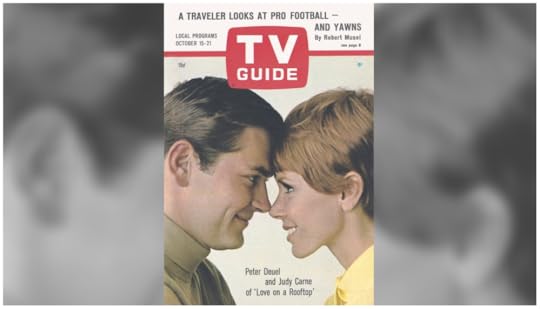
 One of the facts of life, a fact we all have to contend with, is that people die. It's just natural. Judy Carne and Peter Deuel, neither of them yet 30 when they appeared on the cover of this week's issue, are dead. So are Robert Goulet and Sally Ann Howes, the stars of Brigadoon, the musical that preempts The Hollywood Palace this week on ABC (Saturday, 9:30 p.m.). In fact, many of the people featured in this issue of TV Guide have passed away in the 57 years since it was published. And if they haven't, their careers have.
One of the facts of life, a fact we all have to contend with, is that people die. It's just natural. Judy Carne and Peter Deuel, neither of them yet 30 when they appeared on the cover of this week's issue, are dead. So are Robert Goulet and Sally Ann Howes, the stars of Brigadoon, the musical that preempts The Hollywood Palace this week on ABC (Saturday, 9:30 p.m.). In fact, many of the people featured in this issue of TV Guide have passed away in the 57 years since it was published. And if they haven't, their careers have. And then there's William Shatner. As Michael Fessier Jr. (1939-2014) relates, the star of Star Trek is enjoying the good life. They've been interrupted by a young man, "eager-to-please," asking Shatner, "Would you like something cold to drink?" The Shat, after ordering, tells Fessier, "Before, I always thought that kind of, uh . . . toadying was beneath human dignity. But for the first time I’m able to see the reason for it. These little attentions do help. It makes life easier for me."
The road to the stars hasn't been easy for Shatner; after some success on stage, he declined a seven-year contract from Fox. "I was going to set Hollywood and Broadway on fire my own way," he remembers. Instead, except for some well-regarded television appearances, his career consisted of one mistake after another. He turned down the lead in Dr. Kildare. He was upstaged by Walter Matthau in A Shot in the Dark on Broadway. The pilot for one potential series, Alexander the Great, was a failure, while a series he did do, For the People, was bludgeoned by Bonanza. And while the Broadway play The World of Suzie Wong was "a money-maker," it did nothing for his career or his sanity. "Every night was a nightmare," he says. "I almost had a nervous breakdown." He was on the verge of giving up acting and turning to directing if the Star Trek pilot didn't pan out.
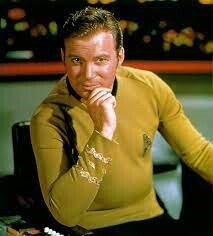 We all know how that turned out. And, in the most Shat-like way, he reveled in the success. "I’ve gotten a great insight into the omnipotence of the series lead. Everybody does his best not to upset the star. It’s an almost unique position few in the entertainment world achieve . . . It’s like absolute power." He's used that power to change things on the set; for one thing, he's no longer subjected to last-minute script revisions. He requested, and got, a small gym set up for him by the studio. His suggestions are welcomed by Gene Roddenberry, who calls them "intelligent." And, says Fessier, "Too many ostensibly facetious allusions to his own 'hero' ambitions sneak into his conversation."
We all know how that turned out. And, in the most Shat-like way, he reveled in the success. "I’ve gotten a great insight into the omnipotence of the series lead. Everybody does his best not to upset the star. It’s an almost unique position few in the entertainment world achieve . . . It’s like absolute power." He's used that power to change things on the set; for one thing, he's no longer subjected to last-minute script revisions. He requested, and got, a small gym set up for him by the studio. His suggestions are welcomed by Gene Roddenberry, who calls them "intelligent." And, says Fessier, "Too many ostensibly facetious allusions to his own 'hero' ambitions sneak into his conversation."But while Shatner enjoys his stardom, he's also frustrated; he's already 35 ("It's a good age this year, but what about next?") and hasn't achieved what he thought he'd have by now. Still, it's hard to complain. Says Leslie Stevens, who wrote and directed the experimental movie Incubus in which Shatner starred, "He has an unquestioned greatness. How long it will take to flower I don’t know. . . But he has always kept his standards intact."
That was 57 years ago, and today, William Shatner is 92, still famous as Captain Kirk, but almost as famous simply for playing himself, which is what he's done the last few decades, no matter what the role. And whether you're a fan or not, there's something about being able to stay at that level of stardom for so long that impresses. Perhaps his star never reached the heights he thought it would, or hoped it would—but boy, it's burned for a long, long time, and one has to think that William Shatner is still enjoying the last laugh.
l l l
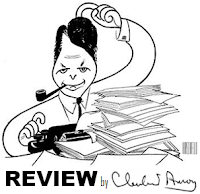 Throughout the 60s and early 70s, TV Guide's weekly reviews were written by the witty and acerbic Cleveland Amory. Whenever we get the chance, we'll look at Cleve's latest take on the shows of the era.
Throughout the 60s and early 70s, TV Guide's weekly reviews were written by the witty and acerbic Cleveland Amory. Whenever we get the chance, we'll look at Cleve's latest take on the shows of the era. The scenery in NBC's new adventure series Tarzan is, Cleveland Amory says, breathtaking. When that's the lead to your review, methinks you might be in trouble. And in this version, featuring "an articulate, modern Tarzan who is familiar with the ways of civilization," trouble is, indeed, as near as the latest hanging vine. As Cleve notes, "when you combine the idea of the Noble Savage with the clichés of modern TV, something's got to give. We wish it were the clichés, but in this show it isn't."
Scenery notwithstanding, any Tarzan series is only as good as the actor playing Tarzan, in this case Ron Ely. He looks like Tarzan—he's tall, has a good build, and is reasonably convincing as he's swinging from tree to tree or diving into waterfalls. And he sounds like Tarzan, but that's because the famous yell actually belongs to the famous Johnny Weissmuller, whose original yell is electronically reproduced. And, again, when that's all you have to say about Tarzan, it seems as if something is lacking.
Speaking of which, something else that's lacking is Tarzan's mate, Jane. In this version, Tarzan has only his loyal Cheetah and a little boy named Jai, "a part which is, if you can believe it, even sillier than “Boy” used to be in the old Tarzan films." The plots are filled with mysterious deaths, traps for Tarzan, elephants, coral snakes, murders, good-guy lions and bad-guy lions (who look exactly alike)—well, you get the point. Cleve's verdict: "We recommend Tarzan highly as a show to put the kids to bed by, but that’s as far as we can go." As for the rest of us, tune in again next week—same time, different station.
l l l
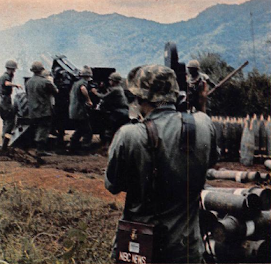 It's no surprise to find out that the Pentagon has some complaints about the way television is covering the war in Vietnam, and Neil Hickey reports on his ten-week investigation into "the honesty and adequacy of television's coverage of the war; and to measure, count and catalog the problems relating to the coverage." It is clear, writes Hickey, that television is the "single most potent element" in forming public opinion, and that the war is certain to be the biggest issue in this year's midterm elections and 1968's presidential campaign. (Boy, is that an understatement.)
It's no surprise to find out that the Pentagon has some complaints about the way television is covering the war in Vietnam, and Neil Hickey reports on his ten-week investigation into "the honesty and adequacy of television's coverage of the war; and to measure, count and catalog the problems relating to the coverage." It is clear, writes Hickey, that television is the "single most potent element" in forming public opinion, and that the war is certain to be the biggest issue in this year's midterm elections and 1968's presidential campaign. (Boy, is that an understatement.)The Pentagon's misgivings about television coverage boil down to several points: that television focuses too much on the visual—battle scenes and air strikes—without covering what's going on politically in Vietnam; that TV crews move with smaller units, even though what happens at the platoon and squad level is only minimally significant, thus providing an out-of-context story; that young and inexperienced reporters lack the ability to cover the nuances of the war; that footage is edited to emphasize violence and drama; that too many internationals, who strongly disagree with the United States, have been employed in the news bureaus; and that casualties are occasionally portrayed on TV before the next-of-kin are notified.
Newsmen interviewed by Hickey concede some of the points; NBC's Jack Fenn allows that, because violence is inherently exciting, some events covered on television are inflated beyond their actual importance. Another newsman says that television at times try to explain things that can be done much better by newspaper reporters. "Television," he says, "will never replace The New York Times." (Neither will today's New York Times, for that matter.)
Are the reporters too inexperienced to understand the full picture? According to CBS's Charles Collingwood, "Vietnam is the most physically demanding role that reporters have ever been asked to take." It's a young man's war, with a young man's stamina required to keep up with it, and the networks are aware that when it comes to the wiles of Vietnamese politics, these young reporters are often out of their depth. Kalischer, the veteran, says that "I'm supposed to be the grand old man around here, and I' reluctant to do it myself." For that reason, the networks tend to leave the background reporting to occasional visits by newsmen like Eric Sevareid, Howard K. Smith and Chet Huntley, and to the veterans of the Asia bureau, who've had vastly more experience covering the area.
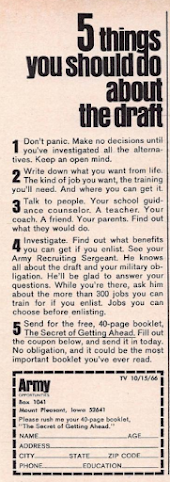 The biggest challenge faced by television, according to Hickey, is "to achieve balance between the seductive and the significant; to submerge the conviction that a sense of violence is important merely because a camera is recording it; to find the substance behind the shadow." Because television is limited in the scope of what it can cover, it often concentrates on what it can cover, at the platoon level." The Pentagon says this can be misleading; as Peter Kalischer, a veteran correspondent from Korea, points out, "Wars always look better from division headquarters than they do in the foxholes." And, in fact, commanders in the field are often more responsive to TV's challenges than the superiors in Washington. But it remains true that a visual medium like television has to go where the action is, even when the information is more available at brigade headquarters.
The biggest challenge faced by television, according to Hickey, is "to achieve balance between the seductive and the significant; to submerge the conviction that a sense of violence is important merely because a camera is recording it; to find the substance behind the shadow." Because television is limited in the scope of what it can cover, it often concentrates on what it can cover, at the platoon level." The Pentagon says this can be misleading; as Peter Kalischer, a veteran correspondent from Korea, points out, "Wars always look better from division headquarters than they do in the foxholes." And, in fact, commanders in the field are often more responsive to TV's challenges than the superiors in Washington. But it remains true that a visual medium like television has to go where the action is, even when the information is more available at brigade headquarters. Col. Rodger R. Bankson, Chief of Information in Vietnam, tells TV Guide that the military and media have been working closely to address the challenges faced by both in covering this war. He adds, "We have no problem out here which men of good will can’t solve." Considering that the Vietnam War will continue on for more than six additional years, with tensions rising both domestically and at the front, one can't help but regard this as whistling in the dark.
The ad on the left, which runs in this week's issue, is a total product of its time, a stark reminder of the concerns many young people and their parents are facing at the time; one could read the first point more accurately as, "To go to Canada or to not go to Canada, that is the question," and it's going to become even more of a question as the Sixties progress. I've shared this anecdote before, but when I was in high school in the 1970s, discussing post-graduation options with classmates, we were reminded by our teacher that, if we'd been ten years younger, we'd be talking about the draft rather than what we'd be doing next year. (And at this point, we still had to register for Selective Service, and notify them whenever we changed addresses.) Boy, we didn't realize just how good we had it back then.
l l l
No Sullivan vs. The Palace this week, as I mentioned, but there's still plenty to look at. If you want, you can certainly check out Brigadoon, which, as I mentioned at the top, has an excellent cast including Robert Goulet and Sally Ann Howes; the original production won Best Musical from the New York Drama Critics in 1947, and this adaptation was done by Emmy-winner Ernest Kinoy. If you're in the mood for a lyrical evening, watch it on YouTube .
Something I wanted to make sure to mention is the Sunday night movie on KTVU, The Thief (7:30 p.m.), a tense spy drama starring Ray Milland as an American scientist passing on atomic secrets to the communists. It's very good, but the movie's real hook is that there is no dialog whatsoever. And Ed Sullivan probably would have beaten Palace this week anyway; his guests include Eddie Albert, who reads Stephen Vincent Benét’s "A Ballad of William Sycamore"; and Carroll Baker, who offers songs from Gentlemen Prefer Blondes; comedians Allan Sherman, and Stiller and Meara; singer Sergio Franchi; the singing-dancing Kessler Twins from Germany; and the Suzuki Violins, 10 young Japanese instrumentalists. (8:00 p.m., CBS)
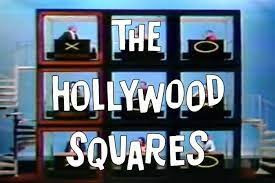 The new season formally started last month, but we're still seeing new shows being rolled out as part of the daytime schedules. NBC has two of them debuting on Monday, beginning with The Pat Boone Show at 10:00 a.m.; this Monday-Friday half-hour variety show will run until June 30, 1967 (when it's replaced by the game show Personality). That's followed at 10:30 a.m. by a game show with a slightly longer run: The Hollywood Squares! "Peter Marshall hosts this game show based on tick-tack-toe." As originally produced, Squares featured five regulars: Rose Marie, Morey Amsterdam, Abby Dalton, Wally Cox, and Cliff Arquette as Charley Weaver. They'll be joined each week by four guests, and this week those guests are Agnes Moorehead, Ernest Borgnine, Sally Field, and Nick Adams. The most popular square of all, Paul Lynde, doesn't become a regular until 1968; The Hollywood Squares remains on the NBC daytime lineup until 1980, with a syndicated nighttime version running from 1971 to 1981.
The new season formally started last month, but we're still seeing new shows being rolled out as part of the daytime schedules. NBC has two of them debuting on Monday, beginning with The Pat Boone Show at 10:00 a.m.; this Monday-Friday half-hour variety show will run until June 30, 1967 (when it's replaced by the game show Personality). That's followed at 10:30 a.m. by a game show with a slightly longer run: The Hollywood Squares! "Peter Marshall hosts this game show based on tick-tack-toe." As originally produced, Squares featured five regulars: Rose Marie, Morey Amsterdam, Abby Dalton, Wally Cox, and Cliff Arquette as Charley Weaver. They'll be joined each week by four guests, and this week those guests are Agnes Moorehead, Ernest Borgnine, Sally Field, and Nick Adams. The most popular square of all, Paul Lynde, doesn't become a regular until 1968; The Hollywood Squares remains on the NBC daytime lineup until 1980, with a syndicated nighttime version running from 1971 to 1981. Here's a happy coincidence on Tuesday: at 8:30 p.m., The Man from U.N.C.L.E.'s Robert Vaughn is a guest on The Red Skelton Hour; in one skit, Vaughn plays Victor Virtue, "trying to rid the West of sin and saloon girls" until he runs into Sheriff Deadeye; I'm sure Vaughn's at his smarmy best in this role. Meantime, at 9:00 p.m. on KTLA, his U.N.C.L.E. co-star, David McCallum (of happy memory) stars in the memorable Outer Limits episode "The Sixth Finger"—that's the one where he becomes the smartest man in the world and winds up with this huge head. I'm sure you know which one I'm talking about.
Two completely different types of murder mysteries highlight Wednesday night's schedule. At 9:00 p.m., Bob Hope's second comedy special of the season is a spy spoof called "Murder at NBC." Bob plays Von Smirtch, a mad scientist who's developed a nuclear chemical capable of shrinking the entire country so it can be towed away. (That's what it says, folks.) A network newsman is killed while he's about to break the story, hence the show's title. (Given that the NBC logo is prominent on the set of the newscast, it's too bad they couldn't have gotten, say, Edwin Newman to play the victim.) The main appeal of the show is in a fantastic ensemble cast, including Don Adams, Milton Berle, Red Buttons, Johnny Carson, Jack Carter, Bill Cosby, Wally Cox, Bill Dana, Jimmy Durante, Shecky Greene, Don Rickles, Dan Rowan and Dick Martin, Soupy Sales, Dick Shawn and Jonathan Winters. Although it's been mislabeled, you can find it on YouTube .
This is followed at 10:00 p.m. by ABC Stage 67 and the drama "The Confession," starring Arthur Kennedy as a veteran police detective investigating the death of Bonnie (Katharine Houghton), a young girl who entered into a suicide pact with her boyfriend Carl (Brandon de Wilde) when they discovered Bonnie was pregnant. While Bonnie died from the gas, Carl lived—and now Hammond is convinced that Carl should be charged with murder. Interesting concept, described as "the moral dilemma of a police officer who goes beyond the letter of the law to find the truth." Is Hammond a heavy-handed cop willing to bend the law based on his personal feelings, or is he convinced that Carl wanted Bonnie dead, and is just playing the victim card? Jack Gould, the Times TV critic, calls it "A muddled drama about a neurotic detective bent on administering a psychological third degree to suspects," which leads me to believe it was the former.
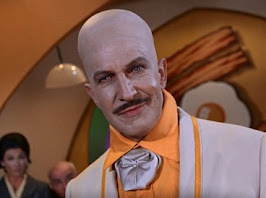 This week's guest villain on Batman (Wednesday and Thursday, 7:30 p.m.) is the great Vincent Price, in the first of three appearances as Egghead (speaking of men with huge heads, or at least foreheads), a super-criminal created especially for the TV series; the story concerns Egghead's efforts to take control (legally, of course) of Gotham City when officials fail to renew the treaty with the Mohican Indian tribe, causing the city to revert back to them. Edward Everett Horton plays Chief Screaming Chicken, and any resemblance to the character he plays in F Troop, Roaring Chicken, is purely intentional.
This week's guest villain on Batman (Wednesday and Thursday, 7:30 p.m.) is the great Vincent Price, in the first of three appearances as Egghead (speaking of men with huge heads, or at least foreheads), a super-criminal created especially for the TV series; the story concerns Egghead's efforts to take control (legally, of course) of Gotham City when officials fail to renew the treaty with the Mohican Indian tribe, causing the city to revert back to them. Edward Everett Horton plays Chief Screaming Chicken, and any resemblance to the character he plays in F Troop, Roaring Chicken, is purely intentional.On Friday, ABC News presents a special that's out of this world. No, I mean literally. It's "We Are Not Alone" (10:00 p.m.), based on the book by New York Times science editor Walter Sullivan and narrated by newsman Edward P. Morgan, which looks at the scientific case for extraterrestrial life. I bring this up as a fairly relevant story, considering the headlines we've been seeing lately about UFOs. (I'd think that the government admitting to the possibility should be enough to convince anyone not to believe it.) For the record, I think it's all a lot of hooey, but I'll admit there are times when I'd be more than happy to be transported somewhere far, far away from the madness of planet Earth.
Running throughout the week are paid political programs; it is an election year, after all, and in this Northern California edition, the dominant race is for governor, with incumbent Pat Brown taking on the challenger, Ronald Reagan—and the Reagan campaign is unleashing its most powerful weapon, the candidate himself. He's on a live half-hour broadcast from his Malibu ranch at 4:00 p.m. Sunday (KPIX, KSBW, and KXTV), appears on the CBS News special Campaign 66 (Sunday, 6:00 p.m.), and can be seen for five minutes on Monday, Tuesday, Wednesday, and Thursday (5:20 p.m., KSBW). Brown, who almost certainly was guilty of supreme overconfidence, is on for only five minutes on Wednesday. (7:25, KOVR) Did I mention that next month Reagan will defeat Brown by nearly a million votes?
l l l
And now, a minute or more with another star who's still with us, the irrepressible That Girl herself, Marlo Thomas, who has some fall fashions for us to consider.
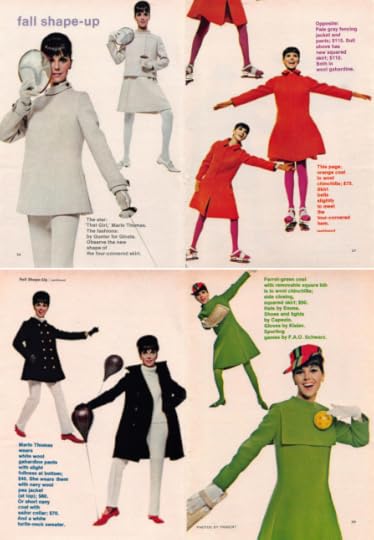
There's something pleasant about being able to pick up an issue from the Sixties and not having to refer to everyone in the past tense. Ron Ely and Katharine Houghton are still around as well, and I'm sure they're not the only ones!
l l l
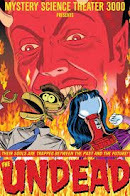 MST3K alert: The Undead (1957) An unscrupulous psychic researcher hypnotizes a street-walker and learns of her past life as a falsely-accused witch in the Middle Ages. Pamela Duncan, Richard Garland. (Thursday, second part of KGO's All-Night Movie, beginning at 1:30 a.m.) Directed by Roger Corman, perhaps the best analysis came from Mike Nelson, who commented, "I've never known more about what isn't going on in a movie." I've seen this several times, and I still feel this way. And we didn't even get a short at the beginning. TV
MST3K alert: The Undead (1957) An unscrupulous psychic researcher hypnotizes a street-walker and learns of her past life as a falsely-accused witch in the Middle Ages. Pamela Duncan, Richard Garland. (Thursday, second part of KGO's All-Night Movie, beginning at 1:30 a.m.) Directed by Roger Corman, perhaps the best analysis came from Mike Nelson, who commented, "I've never known more about what isn't going on in a movie." I've seen this several times, and I still feel this way. And we didn't even get a short at the beginning. TV
Published on October 14, 2023 05:00
October 13, 2023
Around the dial
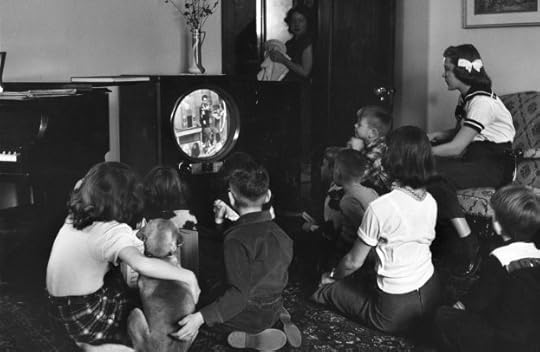
 Ah, Halloween is just around the corner, so I expect we'll see some seasonal fare over the next couple of weeks, starting at Comfort TV, where David looks at the
haunted houses of classic TV
. When you think about it, all the houses from classic television shows are haunted, in a way—haunted by the ghosts of the past, the ghosts of our own memories.
Ah, Halloween is just around the corner, so I expect we'll see some seasonal fare over the next couple of weeks, starting at Comfort TV, where David looks at the
haunted houses of classic TV
. When you think about it, all the houses from classic television shows are haunted, in a way—haunted by the ghosts of the past, the ghosts of our own memories.In that spirit, we'll continue to The Last Drive In and a look at the 1960 horror classic The Leech Woman , starring Grant Williams, Coleen Gray, and Phillip Terry. It will come as a surprise to absolutely no one that this movie was featured on MST3K, so expect to see it in a TV Guide one of these days.
At Silver Scenes, the Metzingers visit the 1959-61 series Riverboat , starring Darren McGavin and Burt Reynolds. It's notable for three things: an early appearance of Reynolds in a prominent role; the fact that McGavin appeared in this series at the same time as he was in the syndicated Mike Hammer; and an epic quote from Reynolds (who did not get along with McGavin) that McGavin "is going to be a very"T disappointed man on the first Easter after his death."
John continues his look at Seventies TV at Cult TV Blog with (apparently) the only existing episode of Barlow , a 1971-75 police drama that captures the evolution of television portrayals of police; it's also notable in that, per Darren McGavin, series star Stratford Johns played the character Barlow in two different shows being broadcast at the same time.
Let's stay in the UK and jump over to The View from the Junkyard, where Roger and Mike exchange quips and opinions on the Avengers episode " The Winged Avenger ," a Steed/Mrs. Peel adventure involving the murders of wicked businessmen "who don't deserve to live." A sticky one there, isn't it? And yet the law must prevail! See what they think, and what you think.
Remember our discussion of Captains and the Kings, the first story of NBC's 1976 series Best Sellers? Well, at Drunk TV Paul reviews the second installment, Once an Eagle , based on the bestseller by Anton Myrer, starring Sam Elliott, Cliff Potts, Darleen Carr, Amy Irving, and Glenn Ford. I remember watching this as well when it was originally on, and Paul's review does it thorough justice.
At Travalanche, it's a feature on Harvey Comics , home of comic books starring cartoon characters such as Casper the Friendly Ghost and Wendy the Good Little Witch, Baby Huey, Richie Rich, Little Audrey, Hermin and Katnip, and others. I read all these comics in the day, and watched their adventures on television. Good memories.
Terence celebrates the 65th anniversary of 77 Sunset Strip over at A Shroud of Thoughts. This is one of the gems of the WB production line of detective shows, a series that has likable characters, interesting storylines, and (at least until the final, lousy season) simply fun to watch. By all means watch the others in the stable: Hawaiian Eye, Bourbon Street Beat, and Surfside 6, but don't miss this one.
At Shadow & Substance, Paul looks at the "unofficial" pilot for The Twilight Zone, " The Time Element ," which aired on Westinghouse Desilu Playhouse in 1958, a year before TZ itself premiered. It doesn't carry the brand name, but nobody could possibly mistake Rod Serling's story as anything other than being from the fifth dimension.
It can be hard to envision Jack Webb as anyone other than Joe Friday, but the Dragnet star could be found on old-time radio in other roles; this week, Martin Grams looks at one of them, Pete Kelly's Blues , in which Webb plays a jazz musician who solves crimes on the sleazy side of the street. The scripts of the 13 programs in the series have now been collected into a book—read all about it.
Finally, at the Comfort TV link at the top of the page, David offered a prayer for peace for those in the Middle East, and I'd like to add one of my own: Blessed are the peacemakers: for they shall be called children of God. —Matthew 5:9. May it be so. TV
Published on October 13, 2023 05:00
October 9, 2023
What's on TV? Monday, October 10, 1955

 I always enjoy these 1950s Philadelphia editions; it's not that I have any connection to the city (I've never been there), but I get a charge out of seeing the names of some of my old sports heroes, people like John "The Voice of God" Facenda and Jack Whitaker—the kind they don't make anymore. Something else you don't see anymore: network coverage of a speech given by the Secretary of State, but that's what you get at 1:00 p.m. when John Foster Dulles addresses the American Legion convention in Miami. And ther's a nice bit of cross-promotion when Dave Garroway interviews Tonight host Steve Allen on Today. What other favorites do you recognize this week?
-3- WPTZ (NBC) MORNING 6:45 Thought for Today 6:50 Market Reports, Weather 7:00 Today—Garroway Guest: Steve Allen Local news with Pat Landon at 7:25, 7:55, 8:25 A.M. 8:55 Today with Mr. Rivets 9:00 Let Scott Do It—Variety 10:00 Ding Dong School 10:30 Search for Beauty 11:00 Home—Women’s News AFTERNOON 12:00 Tennessee Ernie—Variety 12:30 Feather Your Nest 1:00 My Little Margie—Comedy 1:30 MOVIE—Musical Hollywood Playhouse: “Singing Town” (Italian) 2:00 Robert Q. Lewis—Variety 2:50 Here’s Jack Wilson 3:00 Ted Mack—Variety 3:30 It Pays to Be Married 4:00 Date with Life—Serial DEBUT 4:15 First Love—Serial 4:30 World of Mr. Sweeney 4:45 Modern Romances 5:00 Pinky Lee Show—Kids 5:30 Howdy Doody—Kids COLOR EVENING 6:00 Fun House—Pete Boyle 6:30 MOVIE—Mystery Award Theater: “House of Dr. Belhomme” 7:25 NEWS—Taylor Grant 7:30 TONY MARTIN—Songs 7:45 NEWS—John Cameron Swayze 8:00 SID CAESAR—Comedy 9:00 MEDIC—Drama 9:30 ROBERT MONTGOMERY “Paper Town” 10:30 I SPY—Adventure 11:00 NEWS—Taylor Grant 11:10 SPORTS—Jack Pyle 11:15 Weather—Judy Lee 11:20 Les Paul & Mary Ford 11:25 Tonight in Philadelphia 11:30 Tonight—Steve Allen 1:00 Strange Experiences 1:05 Thought for Tomorrow
I always enjoy these 1950s Philadelphia editions; it's not that I have any connection to the city (I've never been there), but I get a charge out of seeing the names of some of my old sports heroes, people like John "The Voice of God" Facenda and Jack Whitaker—the kind they don't make anymore. Something else you don't see anymore: network coverage of a speech given by the Secretary of State, but that's what you get at 1:00 p.m. when John Foster Dulles addresses the American Legion convention in Miami. And ther's a nice bit of cross-promotion when Dave Garroway interviews Tonight host Steve Allen on Today. What other favorites do you recognize this week?
-3- WPTZ (NBC) MORNING 6:45 Thought for Today 6:50 Market Reports, Weather 7:00 Today—Garroway Guest: Steve Allen Local news with Pat Landon at 7:25, 7:55, 8:25 A.M. 8:55 Today with Mr. Rivets 9:00 Let Scott Do It—Variety 10:00 Ding Dong School 10:30 Search for Beauty 11:00 Home—Women’s News AFTERNOON 12:00 Tennessee Ernie—Variety 12:30 Feather Your Nest 1:00 My Little Margie—Comedy 1:30 MOVIE—Musical Hollywood Playhouse: “Singing Town” (Italian) 2:00 Robert Q. Lewis—Variety 2:50 Here’s Jack Wilson 3:00 Ted Mack—Variety 3:30 It Pays to Be Married 4:00 Date with Life—Serial DEBUT 4:15 First Love—Serial 4:30 World of Mr. Sweeney 4:45 Modern Romances 5:00 Pinky Lee Show—Kids 5:30 Howdy Doody—Kids COLOR EVENING 6:00 Fun House—Pete Boyle 6:30 MOVIE—Mystery Award Theater: “House of Dr. Belhomme” 7:25 NEWS—Taylor Grant 7:30 TONY MARTIN—Songs 7:45 NEWS—John Cameron Swayze 8:00 SID CAESAR—Comedy 9:00 MEDIC—Drama 9:30 ROBERT MONTGOMERY “Paper Town” 10:30 I SPY—Adventure 11:00 NEWS—Taylor Grant 11:10 SPORTS—Jack Pyle 11:15 Weather—Judy Lee 11:20 Les Paul & Mary Ford 11:25 Tonight in Philadelphia 11:30 Tonight—Steve Allen 1:00 Strange Experiences 1:05 Thought for Tomorrow
-6- WFIL (ABC, Du Mont) MORNING 8:30 Romper Room 9:30 MOVIE—Comedy Morning Theater: “Mr. Peek-A-Boo” (French; 1951) 10:45 Wiffil Schoolhouse—Education 11:15 University of the Air—Education “The U.S. and Asia” 11:35 University of the Air—Education “Management Workshop” AFTERNOON 12:00 Lunchtime Theater 12:30 MOVIE—Drama This Is Hollywood: “Avalanche” 1:50 Features for Women 2:30 Bandstand—Bob Horn 5:00 Mickey Mouse Club EVENING 6:00 NEWS—Frank Hall 6:10 Weather—Francis Davis 6:15 Gene Autry—Western 6:45 Range Rider—Western 7:15 NEWS—John Daly 7:30 TOPPER—Comedy 8:00 TV READER’S DIGEST 8:30 CONCERT—Howard Barlow Guest: Mildred Miller 9:00 FOOTBALL—Notre Dame Highlights: Notre Dame-Miami 9:30 MEDICAL HORIZONS 10:00 CAMERA FOUR—Drama 10:30 MR. & MRS. NORTH—Drama 11:00 WRESTLING—Film 12:00 NEWS—Frank Hall 12:10 Weather—Francis Davis 12:15 Beulah—Comedy 12:45 Wanted Persons
-8- WGAL (Lancaster) (CBS, NBC, ABC, Du Mont) MORNING 7:00 Today—Garroway Guest: Steve Allen Local news with Pat Landon at 7:25, 7:55, 8:25 A.M. 8:55 NEWS 9:00 College of the Air 9:30 Hymns of Faith—Music 9:45 Perk-up Time—Jr. League 10:00 Ding Dong School 10:30 Search for Beauty 11:00 The Brighter Day—Serial 11:15 Valiant Lady—Serial 11:30 Strike It Rich—Quiz Guest: Joey Adams AFTERNOON 12:00 TV Farmer—Crop Data 12:15 Love of Life—Serial 12:30 NEWS—Nelson Sears 12:40 NEWS—Frank Whalen 12:45 The Guiding Light 1:00 John Foster Dulles—Talk SPECIAL From the American Legion national convention 1:30 Welcome Travelers 2:00 From the Kitchen Door 2:30 Search for Tomorrow 2:45 Today with Kay—Features 3:00 The Big Payoff—Quiz 3:30 It Pays to Be Married 4:00 Date with Life—Serial DEBUT 4:15 Secret Storm—Serial 4:30 On Your Account 5:00 Slapstick Theater 5:15 House Party—Variety 5:30 Howdy Doody—Kids COLOR EVENING 6:00 Superman—Adventure 6:30 SPORTS, WEATHER, NEWS 7:00 FATHER KNOWS BEST 7:30 TONY MARTIN—Songs 7:45 NEWS—John Cameron Swayze 8:00 BURNS & ALLEN 8:30 TALENT SCOUTS 9:00 I LOVE LUCY 9:30 ROBERT MONTGOMERY “Paper Town” 10:30 STUMP YOUR NEIGHBOR 11:00 NEWS 11:15 Medic—Drama 11:45 Tonight—Steve Allen
10 WCAU (CBS) MORNING 7:00 Morning Show 7:55 Mr. and Mrs.—The Cranes 8:30 NEWS—Bill Campbell 8:35 Kiddie Korner—The Cranes 9:00 Jack Valentine—Songs 9:05 Chef Albert—Recipes 9:30 Junior Hi-Jinx—Cartoons 9:55 NEWS—Gene Crane 10:00 Garry Moore—Variety 10:30 Arthur Godfrey Time 11:30 Strike It Rich—Quiz Guest: Joey Adams AFTERNOON 12:00 Valiant Lady—Serial 12:15 Love of Life—Serial 12:30 Search for Tomorrow 12:45 The Guiding Light 1:00 Homemaker’s Notebook 1:30 Welcome Travelers 2:00 Cinderella Week-end-Quiz 2:30 House Party—Variety 3:00 The Big Payoff—Quiz 3:30 Bob Crosby—Music 4:00 The Brighter Day—Serial 4:15 Secret Storm—Serial 4:30 On Your Account 5:00 Roy Rogers—Gene Autry EVENING 6:00 The Adventurer—Action 6:20 NEWS—John Facenda 6:25 Earl Selby and Mr. Fixit 6:30 Political Talk—Democratic Mayor candidate Richardson Dilworth 6:45 NEWS—Douglas Edwards 7:00 SUPERMAN—Adventure 7:30 ROBIN HOOD—Adventure 8:00 BURNS & ALLEN 8:30 TALENT SCOUTS 9:00 I LOVE LUCY 9:30 DECEMBER BRIDE 10:00 STUDIO ONE—Drama “Uncle Ed and the Circumstance” 11:00 NEWS—John Facenda 11:10 Weather—Phil Sheridan 11:15 SPORTS—Jack Whitaker 11:25 That Man McMahon 11:30 Follow That Man—Drama 12:00 NEWS—John Facenda 12:15 MOVIE—Drama Late Show: “Borderline” (1950)
12 WPFH (Wilmington) (Independent) AFTERNOON 12:00 Music Box—Songs 12:30 Kiddie Show 1:00 MOVIE—To Be Announced 2:00 MOVIE—Western Matinee Theater: “Law of the Timber” 2:55 NEWS 3:00 Grady & Hurst Show EVENING 6:00 MOVIE—Drama First Show: “Went the Day Well?” (English) 6:55 NEWS—Hal Woodard 7:00 PANORAMA—Jack Reynolds 7:30 MOVIE—Drama Evening Playhouse: “Intrigue in Paris” 8:30 HARNESS RACING—Delaware 9:00 BOXING—Preliminaries 10:00 BOXING—St. Nick’s Lulu Prez vs. Boby Courchesne 10:45 NEWS 10:50 GAME OF THE WEEK 11:50 SPORTS—Bill Phieffer 12:00 MOVIE—Comedy Evening Playhouse: “Man Who Could Work Miracles” (English)
TV
Published on October 09, 2023 05:00
October 7, 2023
This week in TV Guide: October 8, 1955
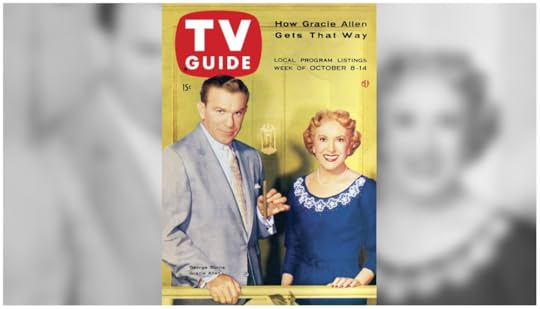
 This week's TV Guide Preview asks the quite sensible question, "Who's doing what on your TV screen during the next seven days?" (That's why it's called a preview, I guess.) It's a week where some old favorites return, while others already back will be up to new tricks. (Trust me, that's what it says.) Plus, there are two spectaculars on tap—one looking to the future, the other to the past.
This week's TV Guide Preview asks the quite sensible question, "Who's doing what on your TV screen during the next seven days?" (That's why it's called a preview, I guess.) It's a week where some old favorites return, while others already back will be up to new tricks. (Trust me, that's what it says.) Plus, there are two spectaculars on tap—one looking to the future, the other to the past. Among your returning favorites, Our Miss Brooks (Friday, 8:30 p.m. ET, CBS) sees Miss Brooks exchanging her classroom at Madison High School for a new position at a private elementary school. Now, don't think it's because she's given up on the students: the school is being razed to make way for a new highway. (And who says urban renewal isn't a good thing?) Since she won't have to work for her nemesis, Mr. Conklin, she takes the opportunity to tell him off once and for all. But since Madison High is closing, Conklin needs a new job as well. And guess where he's headed. . .
Our Miss Brooks isn't the only show on the move: Bishop Fulton Sheen's Life is Worth Living returns on a new network, switching from Du Mont to ABC. (Thursday, 8:00 p.m.) The good Bishop's topic for tonight: "Has Russia Really Changed?" I suppose that's a question that's as timely today as it ever has been.
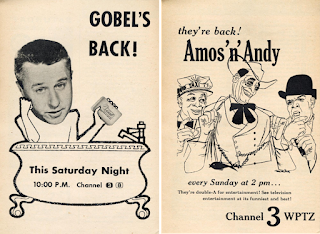 Other returning favorites include George Gobel (Saturday, 10:00 p.m., NBC), Omnibus (Sunday, 5:00 p.m., CBS), and, in syndication, Amos 'n' Andy. (Sunday, 2:00 p.m., WPTZ) John Wayne is the special guest on I Love Lucy. (Monday, 9:00 p.m., CBS) And everyone's favorite baby doctor of the day, Dr. Benjamin Spock, debuts a new series on challenges faced by parents. (Sunday, 3:00 p.m., NBC) Meanwhile, on Saturday morning, Commando Cody takes his last orbit on the schedule (11:00 a.m., NBC); he'll be replaced next Saturday by the children's classic Fury, starring Peter Graves, for a five-year run. It sounds like there's something for almost everyone, so let's get started.
Other returning favorites include George Gobel (Saturday, 10:00 p.m., NBC), Omnibus (Sunday, 5:00 p.m., CBS), and, in syndication, Amos 'n' Andy. (Sunday, 2:00 p.m., WPTZ) John Wayne is the special guest on I Love Lucy. (Monday, 9:00 p.m., CBS) And everyone's favorite baby doctor of the day, Dr. Benjamin Spock, debuts a new series on challenges faced by parents. (Sunday, 3:00 p.m., NBC) Meanwhile, on Saturday morning, Commando Cody takes his last orbit on the schedule (11:00 a.m., NBC); he'll be replaced next Saturday by the children's classic Fury, starring Peter Graves, for a five-year run. It sounds like there's something for almost everyone, so let's get started. l l l
What will life be like for the average American in the year 1976? That is the question being asked in the our first spectacular, 1976—Life in the Future (Sunday, 4:30 p.m., NBC), hosted by Dave Garroway and featuring Wally Cox, Nanette Fabray, Arlene Francis, and Sid Caesar. I'd like to know more about this special, how close they came to predicting the future, and how hard they tried. For instance, Caesar and Fabray appear in a skit about a wife smashing up the family helicopter, which probably owes more to cliches about bad woman drivers than it does any serious attempt at futurism.
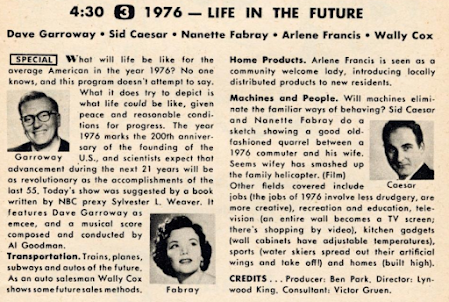
However, I did notice some predictions that seem pretty astute, if slightly off the mark, such as an entire wall that becomes a TV screen; they were a little off on when that would come to pass, but they pretty much nailed the concept, as they did with their idea that shopping could be done by video. Another prediction: kitchen wall cabinets that have adjustible temperature settings (you might be able to accept that under the general category of the smart home). On the other hand, the prediction that jobs would involve less drudgery and more creativity is a split decision—it's true that technology has created much more room for creativity in graphics and science programs, but I think most of us working slobs would agree that life in the office can be pretty dull.
At any rate, these shows with predictions of the future usually wind up being off the mark—except, perhaps, for The Jetsons.
l l l
Since we're looking at a Philadelphia issue this week, we shouldn't be surprised to run into Dick Clark, but we might not have expected to see him as host of House of Charm (Saturday, 6:30 p.m., WFIL—the ABC affiliate, natch), in which he "discusses what prospective home-owners should look for when inspecting the construction of new homes." A special feature at the end of each episode is "Rate a Contractor," where Dick and two inspectors discuss and rate the work done by home contractors. OK, I made that last part up, but it works, doesn't it?
In the second part of our future/past doubleheader, NBC recreates the history of pop entertainment from 1902 to the present in Show Biz: An Enterainment History (Sunday, 7:30 p.m.), a 90-minute spectacular. Art Linkletter hosts, and Groucho Marx narrates, while an all-star cast takes viewers through the the histories of vaudeville, burlesque, and nickelodons; nightclubs, Broadway, radio and movies; and USO shows and television. Rosemary Clooney, Dennis Day, Phil Harris, Beatrice Kay, Buster Keaton, Eartha Kitt, Bert Lahr, and Groucho's daughter Melinda Marx are the stars.
Opposite that, Ed Sullivan counters with some variety power of his own. (8:00 p.m., CBS) Tonight, Ed presents a filmed preview of the upcoming MGM musical Guys and Dolls, including recreated performances with the movie's stars, Marlon Brando, Jean Simmons, Frank Sinatra, and Vivian Blaine. Other guests on tonight's show includ singer June Valli, comedian Johnny Carson, and the singing Les Compagnons de la Chanson.
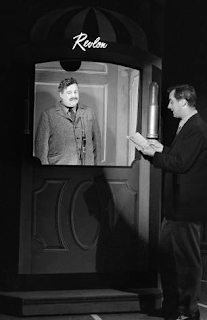 Jackie Gleason is the star in Monday's Studio One play "Uncle Ed and Circumstance," adapted by Frank D. Gilroy from Gleason's own story. (10:00 p.m., CBS) Gleason plays the black sheep of an extended Irish family, who galvanizes all of Staten Island when he becomes a contestant on The $64,000 Question. Interesting, at least to me, is that Question's emcee Hal March, who did act in various roles from time to time (including a Question parody with Jack Benny a couple of years later) doesn't play himself tonight*; the role of the emcee is played by actor John Baragrey.
Jackie Gleason is the star in Monday's Studio One play "Uncle Ed and Circumstance," adapted by Frank D. Gilroy from Gleason's own story. (10:00 p.m., CBS) Gleason plays the black sheep of an extended Irish family, who galvanizes all of Staten Island when he becomes a contestant on The $64,000 Question. Interesting, at least to me, is that Question's emcee Hal March, who did act in various roles from time to time (including a Question parody with Jack Benny a couple of years later) doesn't play himself tonight*; the role of the emcee is played by actor John Baragrey.*But then, in the TV Teletype New York, we read this tidbit: "Ever notice that Hal March has a broken nose? Well, the guy who broke it for him was Jackie Gleason. Hal guested once on Gleason's old Cavalcade of Stars, where Jackie was to hit him on the schnozz with a breakway bottle. Seems the bottle didn't break away." I'm sure that isn't the reason March isn't on the show, but it's interesting anyway.
On Tuesday, Arlene Francis originates her Home show from the Cleveland Mall (11:00 a.m., NBC), and to show you how we've been conditioned to think over the years, the Cleveland Mall isn't a shopping center, but a landscaped public park, a la the Mall in Washington, D.C. It was constructed between 1910 and 1931, and exists on the National Register of Historic Places. This has only a marginal connection to television, but I think it's an example of how the meaning of things changes over time; nobody in 1955 would have thought "shopping" when they heard the word "mall." Of course, the way malls are collapsing around the country, maybe we're headed back in that direction.
Mickey Mouse is the star of Wednesday's Disneyland (7:30 p.m., ABC), with the entire hour devoted to clips from Mickey cartoons. Included is "Mickey and the Beanstalk," narrated by Sterling Holloway (whom you might recognize as the voice of Disney's Winnie the Pooh) and featuring Donald Duck and Goofy as his sidekicks. We also see Mickey conducting a band, climbing the Alps, and engaging with Chip and Dale. I wonder what Mickey would think of Disney today?
On Thursday, the fourth star of Four Star Playhouse, Ida Lupino, stars in "The Face of Danger" as a woman remembering her romance with a wanted outlaw. (9:30 p.m., CBS) Paul Picerni, who'll go on to become one of Eliot Ness's Untouchables, co-stars as the outlaw. I thought she might have directed it as well, since she was one of the first prominent female directors—and a very good one, too—but no such luck; the episode was directed by Roy Kellino.
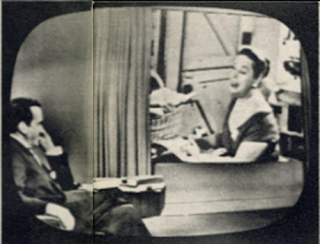 Friday, Ed Murrow's guests on Person to Person (10:30 p.m., CBS) are Charlton and Lydia Heston, followed by Mr. and Mrs. Bert Bacharach. He's the men's fashion expert; his son is the songwriter. Person to Person's gimmick, if you will, was that Murrow, from the CBS studios, would interview his guests long distance in their homes; elsewhere in this issue, famed etiquette expert Amy Vanderbilt tells us what it's like when you have CBS crews invading your home to do Person to Person. Among the things you should know: the phone company will be putting a tower up on your property, the network will be tapping your main power line, and you'll be invaded by 18 crewmen, including cameramen, sound technicians, and someone in charge of hazards—like cats. (The Vanderbilt household has four mother cats and 13 kittens, plus a rabbit and a bloodhound.) And when the time comes, you don't even see Murrow, because there's no monitor for the interviewee; instead, the voice comes over a speaker, while you look just to the right of the camera. Oh, and the crew will be at your home until about 3:00 a.m. picking up, so be sure you have a buffet available for them. It's only proper etiquette, after all.
Friday, Ed Murrow's guests on Person to Person (10:30 p.m., CBS) are Charlton and Lydia Heston, followed by Mr. and Mrs. Bert Bacharach. He's the men's fashion expert; his son is the songwriter. Person to Person's gimmick, if you will, was that Murrow, from the CBS studios, would interview his guests long distance in their homes; elsewhere in this issue, famed etiquette expert Amy Vanderbilt tells us what it's like when you have CBS crews invading your home to do Person to Person. Among the things you should know: the phone company will be putting a tower up on your property, the network will be tapping your main power line, and you'll be invaded by 18 crewmen, including cameramen, sound technicians, and someone in charge of hazards—like cats. (The Vanderbilt household has four mother cats and 13 kittens, plus a rabbit and a bloodhound.) And when the time comes, you don't even see Murrow, because there's no monitor for the interviewee; instead, the voice comes over a speaker, while you look just to the right of the camera. Oh, and the crew will be at your home until about 3:00 a.m. picking up, so be sure you have a buffet available for them. It's only proper etiquette, after all. l l l
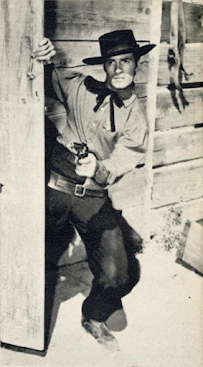 I think there's a general consensus that The Life and Legend of Wyatt Earp was the first of the so-called "adult" Western—in other words, as opposed to the cowboys-and-Indians features by Roy Rogers, Gene Autry, and the like. (It debuted four days before Gunsmoke, or we might not be having this conversation.) We get confirmation of that in this week's review, as Bob Stahl refers to Wyatt Earp as "first to be offered up" in the genre; and, he adds, "If the others are as good, adult viewers will become as Western-conscious again as they were back in their own childhood days."
I think there's a general consensus that The Life and Legend of Wyatt Earp was the first of the so-called "adult" Western—in other words, as opposed to the cowboys-and-Indians features by Roy Rogers, Gene Autry, and the like. (It debuted four days before Gunsmoke, or we might not be having this conversation.) We get confirmation of that in this week's review, as Bob Stahl refers to Wyatt Earp as "first to be offered up" in the genre; and, he adds, "If the others are as good, adult viewers will become as Western-conscious again as they were back in their own childhood days."For one thing, the show's based on a true-life character, whose exploits "were so crammed with gun-slinging action, suspense and excitement that a producer could hardly go wrong in basing a show on his life." But the show has more going for it than that; there's also its handsome star, Hugh O'Brian, who is "near perfect" as Earp. O'Brian hits all the right notes, "avoiding the sham heroics and adding bits of humor to lighten the taut action"; Stahl believes O'Brian "might conceivably nudge Fess Parker's Davy Crockett out of his favorite position with the kids and who most certainly will appeal to women." The scripts, by author-playwright Frederick Hazlitt Brennan, are also excellent, tightly-written stories, "with little phony romance to clutter up the action." The supporting actors are good as well, and the series has an authentic look in sets, costumes, and music.
Wyatt Earp was also one of the first series to have a clearly defined story arc, although it might not be readily apparent yet; it begins in Ellsworth City, Kansas, where Earp begins his career as a lawman, and through the six seasons of the series, it progresses through various mileposts in the real Earp's life, as he moves to Wichita, Dodge City, and finally Tombstone, where the series culminates with the famed Gunfight at the OK Corral.
An interesting sidenote is added by the editor: Welcome Ann Earp, of TV Guide's St. Louis editorial department, is a distant cousin of Wyatt Earp, and has studied his life extensively. According to her, the program could be "more accurate," and that Earp was likely more "taciturn and serious" than O'Brian plays him. It seems to me that of all the magazines in America in 1955, it's only fitting that a relative of Wyatt Earp would work for TV Guide.
l l l
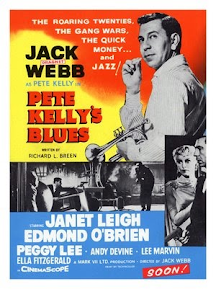 Some notes from the news: Sheilah Graham, TV Guide's insider columnist, reports that Jack Webb has decided to stay with Dragnet. If that comes as a surprise to you that this was even up for discussion, Webb had recently made a movie called
Pete Kelly's Blues
, and had planned to play Pete on TV when it became a weekly series. Reviews were not positive, however, and so Webb sticks with Dragnet for four additional seasons (plus an additional four in the Sixties), and settles for TV immortality.
Some notes from the news: Sheilah Graham, TV Guide's insider columnist, reports that Jack Webb has decided to stay with Dragnet. If that comes as a surprise to you that this was even up for discussion, Webb had recently made a movie called
Pete Kelly's Blues
, and had planned to play Pete on TV when it became a weekly series. Reviews were not positive, however, and so Webb sticks with Dragnet for four additional seasons (plus an additional four in the Sixties), and settles for TV immortality.Meanwhile, you might recall that a few weeks ago we read about Loretta Young's absense from her weekly anthology series due to fatigue. Sheilah says that someone suggested Loretta might be able to return sooner if she confined her workload to hosting, rather than starring, in the show. Her respone: "It's cheating. A hostess, after greeting her guests, should have fun with them." Spoken like a true Miss Manners!
In Hollywood, Dan Jenkins reports that the Federal Government is going after the major movie studios for allegedly engaging in a conspiracy to withhold their movies from television. So far, the only studio to comply has been Republic, which was just a formality since they'd already released 80 percent of their movies to TV. The studios claim that making their movies available would glut the market and "drive the price down to mere peanuts."
And this week's As We See It editorial is an open letter to baseball Commissioner Ford Frick, urging him to prevent teams from cutting back on their telecasts. The World Series, which ended last week with the Brooklyn Dodgers taking the title, was terrific to watch, but team owners should not take that to mean that television threatens the live gate. Most of television's advantages over live attendance (high-priced parking, overpriced concessions, uncomfortable seats, and surly ushers) can be remedied without pointing the finger at TV. In addition, televised baseball has, if anything, increased the game's appeal, especially with youngsters. (Note to today's owners: having World Series games that end after midnight on school nights is not the way to attract kids.) The editors see no reason why most, if not all, of a team's games, both home and away, can't be televised. The moral of the story: televise it, and they will come.
l l l
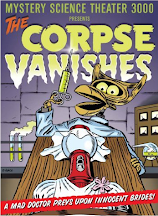 MST3K alert: The Corpse Vanishes (1942) Nightcap Theater: A scientist tries to keep his elderly wife perpetually young. Bela Lugosi, Luana Walters, Tristram Coffin. (Saturday, 12:15 a.m., WFIL) I suppose that's accurate as far as it goes, but the real story is that brides are dropping dead at the altar, and their bodies are being kidnapped (corpsenapped?) by Lugosi in order to literally suck the life out of them and inject it into his shrewish wife. There's an intrepid reporter, a handsome doctor, a newspaper editor that would do Simon Oakland proud, and a midget sidekick. Plus, in the original MST3K airing, there's an episode of Commando Cody's Radar Men From the Moon. What more can anyone possibly want? TV
MST3K alert: The Corpse Vanishes (1942) Nightcap Theater: A scientist tries to keep his elderly wife perpetually young. Bela Lugosi, Luana Walters, Tristram Coffin. (Saturday, 12:15 a.m., WFIL) I suppose that's accurate as far as it goes, but the real story is that brides are dropping dead at the altar, and their bodies are being kidnapped (corpsenapped?) by Lugosi in order to literally suck the life out of them and inject it into his shrewish wife. There's an intrepid reporter, a handsome doctor, a newspaper editor that would do Simon Oakland proud, and a midget sidekick. Plus, in the original MST3K airing, there's an episode of Commando Cody's Radar Men From the Moon. What more can anyone possibly want? TV
Published on October 07, 2023 05:00
October 6, 2023
Around the dial
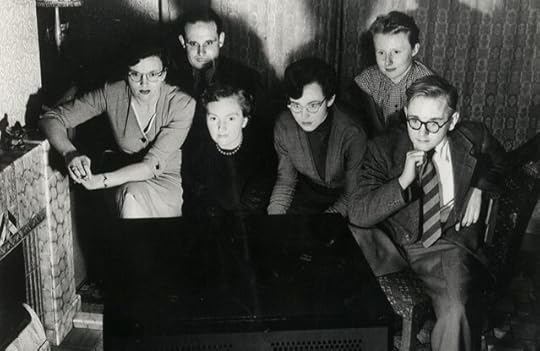
 At Comfort TV, David honors the late David McCallum with a look at some of the actor's
finest classic television roles
, from a 1953 performance on British TV to his 1986 reunion with Robert Vaughn on The A-Team—a career marked with warm and intelligent portrayals.
At Comfort TV, David honors the late David McCallum with a look at some of the actor's
finest classic television roles
, from a 1953 performance on British TV to his 1986 reunion with Robert Vaughn on The A-Team—a career marked with warm and intelligent portrayals.Dick Carr's work on Alfred Hitchcock Presents continues at bare-bones e-zine as Jack looks at the first season story " Salvage ," co-written with Fred Freiberger, and starring a young Gene Barry, along with Nancy Gates and Elisha Cook, Jr.
If you have the same trouble keeping up with what's on various streaming services as I do, you'll welcome this helpful note from Silver Scenes with a look at some of the latest offerings on Tubi . Classic television is always on the list, including the 1966 WWII adventure series Jericho.
At The Horn Section, Hal returns to F Troop with the season one episode " Go For Broke ," in which our heroic Sgt. O'Rourke must figure out how to replenish the fort's pension fund—which O'Rourke lost in a shady poker game—before the Inspector General arrives.
Cult TV Blog continues a look at the 1970s, as John moves on to the BBC series Paul Temple , which was a big hit—in Germany!—and, hence, is only available today by watching episodes dubbed into German. Watch the episode "The Quick and the Dead," and you'll see it's worth it.
At Classic Film and TV Corner, Maddy has her recommendation for five TV horror series for Halloween . Among the series are two I can testify to: Night Gallery and Sapphire & Steel, the latter starring none other than the aforementioned David McCallum.
Eyes of a Generation has a very interesting piece on the history of ABC's first handheld cameras . If you watch historic coverage of news and sporting events, you know the impact handhelds have had, and ABC had not one but two designs: one from LA, the other from New York.
Martin Grams has a great look at the history of the radio show Bold Venture, which starred none other than Humphrey Bogart and Lauren Bacall. It's long been highly sought after, and now a Kickstarter campaign seeks to make them available to OTR fans.
At A Shroud of Thoughts, Terence pays tribute to the career of the great Sir Michael Gambon , who died last month aged 82. Gambon starred in such diverse projects as the Harry Potter movie series, Maigret, and the unforgettable The Singing Detective.
Remember Andy Griffith's foray into science fiction, Salvage 1 (not to be confused with the above-mentioned Salvage)? Television Obscurities does, and Robert reviews the initial episode (after the pilot), " Dark Island ," which takes place a long way from Mayberry.
We'll wrap things up at The View from the Junkyard, where Mike continues his reviews of the Saturday morning series Land of the Lost with the episode " The Hole ," a literate, intelligent installment in a series that was a cut above the standard Saturday life-action fare. TV
Published on October 06, 2023 05:00
October 4, 2023
The Descent into Hell: "A Sound of Different Drummers" (1957)
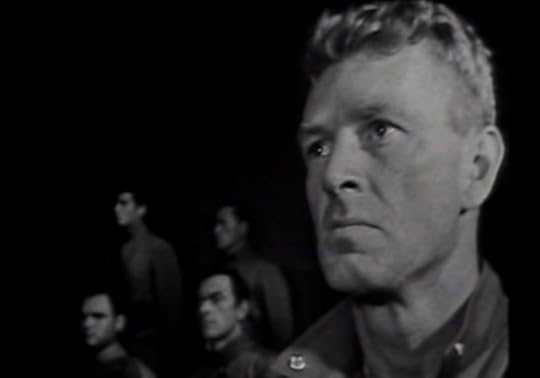
"Books are the treasured wealth of the world and the fit inheritance of generations and nations." ―Henry David Thoreau, Walden
I
 In the future, people live in a high-tech world of domed cities, governed by a World Union, where crime has been eliminated and lifespans lengthened, and computer analysts and tranquilizers to take care of any concerns you might have. Books have been banned in this future world, as independent thought is seen as a source of trouble. “Readers,” those found possessing books, are considered guilty of treason and executed by teams of "Bookmen," who then take the confiscated books to the "library," where technical and instructional books are catalogued and all others are destroyed.
In the future, people live in a high-tech world of domed cities, governed by a World Union, where crime has been eliminated and lifespans lengthened, and computer analysts and tranquilizers to take care of any concerns you might have. Books have been banned in this future world, as independent thought is seen as a source of trouble. “Readers,” those found possessing books, are considered guilty of treason and executed by teams of "Bookmen," who then take the confiscated books to the "library," where technical and instructional books are catalogued and all others are destroyed. Gordon Miller (Sterling Hayden), one of the Bookmen, finds himself attracted to the new librarian, a young woman named Susan (Diana Lynn). Gordon tries to flirt with her; her response is polite but cautious. He accidentally discovers Susan hiding a book in her clothes, a capital offense—but there is something about her that fascinates him; he has never met anyone like her, and despite his revulsion at her crime, he beings to see her whenever he can.
Gordon Miller (Sterling Hayden), one of the Bookmen, finds himself attracted to the new librarian, a young woman named Susan (Diana Lynn). Gordon tries to flirt with her; her response is polite but cautious. He accidentally discovers Susan hiding a book in her clothes, a capital offense—but there is something about her that fascinates him; he has never met anyone like her, and despite his revulsion at her crime, he beings to see her whenever he can.Gordon's partner and best friend Ben (John Ireland) disapproves of Gordon’s relationship with a Reader. "I don’t want you to make a mistake," Ben tells him. When Gordon challenges Ben on his beliefs, asking him if he ever thinks about anything, Ben replies, "What is there to think about? I don’t want to think. I hate Readers."
Occasionally, Gordon talks with his "analyst," a computerized voice meant to serve as an escape valve; computers replaced human analysts when it was discovered people censored their thoughts on the couch. Gordon tells the analyst (voice of Paul Lambert) about his relationship with Susan, and when he mentions that Susan is a Reader, the analyst repeats over and over that "Readers commit crimes of treason to be punished by death." When Gordon asks him why reading is a crime, the analyst replies that "My answers are scientifically accurate. There is no deviation from the truth."
Despite this, and with Ben growing more suspicious, Gordon continues to see Susan and reads everybook he can lay his hands on. He is torn about the conflict between what he has been taught as a Bookman, and what he learns from being around Susan, and warns her that it is dangerous to be involved with a Bookman; she says life would be worse without him, and he realizes that he loves her. They make plans to marry as soon as their application is approved by the Department of Genetics.
Finally, Susan finally brings him to a secret meeting of Readers. There, he meets their leader, Howard Ellis (David Opatoshu). They talk about the importance of books, and how extraordinary individualism is. When Gordon asks Ellis how things got the way they did, Ellis can only say that it’s complicated, but that they’ve wound up with a society where the individual is the criminal. He then quotes a passage from Walden, by Henry David Thoreau: "If a man does not keep pace with his companions, perhaps it is because he hears a different drummer. Let him step to the music which he hears, however measured or far away." We are not criminals, he tells Gordon, just people who hear different drummers. Susan knew this when she brought him here, but she knew he’d say the right thing at the right time. Gordon wonders how this ruthlessness makes them any different from the Union.
Later, we see Ellis reviewing a plan for Gordon and Susan to escape to one of the free colonies in South America. Things are getting too dangerous for them to remain here; look at how long it’s taken for the Department of Genetics to act on their application. Ellis and the others won’t be accompanying them in the escape, though—he explains that to get out is to give up the fight, and their movement won’t continue to grow.
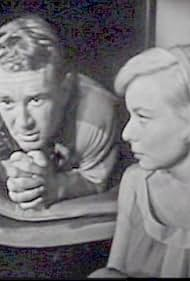 Sterling Hayden and Diana LynnMeanwhile, Ben complains that Gordon misses regular appointments and doesn’t go on Bookman calls anymore; instead, he talks about thoughts and ideas. He warns Gordon that things are getting too dangerous, and that he should give it up before it is too late. When another call comes in for them, Ben forces Gordon to accompany him. Arriving at the scene, Gordon is horrified to find that the accused are George and Mildred, his surrogate parents. He refuses to take part in their execution, and instead flees the scene, vowing to kill Ben for what he has done.
Sterling Hayden and Diana LynnMeanwhile, Ben complains that Gordon misses regular appointments and doesn’t go on Bookman calls anymore; instead, he talks about thoughts and ideas. He warns Gordon that things are getting too dangerous, and that he should give it up before it is too late. When another call comes in for them, Ben forces Gordon to accompany him. Arriving at the scene, Gordon is horrified to find that the accused are George and Mildred, his surrogate parents. He refuses to take part in their execution, and instead flees the scene, vowing to kill Ben for what he has done.Gordon goes to get Susan so they can flee, but it’s too late; her apartment is surrounded by Bookmen, led by Ben. Gordon fights them to give Susan time to escape, and kills two of them before he’s seized and taken away.
In court, Gordon is charged with treason and murder. The prosecutor (Paul Lambert) tells him that his life has been spared in hopes that he will cooperate in uncovering what is obviously a widespread plot to the subvert and overthrow the Union, and asks him to provide the names of the others in the plot and the details of how he was to escape. In return, he will be free to live a normal life, doing less sensitive work. Gordon refuses to respond, and is returned to his cell.
For three weeks Gordon undergoes further interrogation. When he refuses to talk, the Bookmen can only conclude that he must be sick. His analyst tells him that he's denying the most basic instinct in man—survival; when Gordon says he’d then be left alone, the analyst assures him that "I am your friend. I am the only one who loves you."
Finally, Ellis himself visits. He assures Gordon that Susan is safe, but tells him that the court still wants to know the names. He even suggests that Gordon give them the names; twelve more deaths won’t make any more difference. When Gordon again refuses, Ellis tells him what he really wants: Gordon’s martyrdom. The death of a Bookman will strike a great blow for the movement. It will expose a crack, a fissure, in the Union that will continue to grow. It could, in fact, bring down the State altogether.
Gordon spurns this role as well, refusing to serve as their martyr. It’s not that he’s changed his mind; he’ll die before he gives up the names of the others. But it will be for his reasons, not theirs. And his reason is a simple one: he can’t stomach the killing any longer. He’s killed too many people already, for no good reason, and he refuses to take responsibility for one more death. It’s as simple as that.
As a defeated Ellis leaves, another prisoner is thrown in the cell with him—Ben. Gordon expresses shock, but Ben tells him, "Those books. When you were caught, I didn’t want you to know more than me. I read them, Gordon. I read them, I read them! I understand now, Gordon. I understand!"
Vowing that the Union will eventually lose, Gordon finally accepts his martyrdom, as he and Ben are executed.
II
 "A Sound of Different Drummers" aired October, 3, 1957, on Playhouse 90, CBS’s prestige dramatic anthology series. The listing in TV Guide read, "In a totalitarian state of the future, Gordon Miller is a young officer who has the task of suppressing illegal international activity," a curious (not to say somewhat deceptive) description to say the least.
"A Sound of Different Drummers" aired October, 3, 1957, on Playhouse 90, CBS’s prestige dramatic anthology series. The listing in TV Guide read, "In a totalitarian state of the future, Gordon Miller is a young officer who has the task of suppressing illegal international activity," a curious (not to say somewhat deceptive) description to say the least.If you go through the Internet searching for "A Sound of Different Drummers," I can promise you that 9 times out of 10—no, make that 999 times out of 1,000—it'll be in regard to Ray Bradbury's plagiarism lawsuit against Robert Alan Aurthur for borrowing too heavily from Bradbury’s Fahrenheit 451*. Let this be the thousandth, then: a look at the episode itself. For regardless of whether or not Aurther plagiarized Bradbury’s story, "A Sound of Different Drummers" tells a disturbing story of a nightmare world where everything is perfect—as long as you don’t rock the boat.
*If you want to read about that aspect of the story, you can start with Stephen Bowie's excellent writeup here.
This isn’t the first time we’ve seen Robert Alan Aurthur’s name here; he was also responsible for the 1955 Producers' Showcase adaptation of Arthur Koestler’s "Darkness at Noon." In fact, looking at the body of Aurthur’s work, many of his stories deal with injustice of various kinds, particularly race relations (A Man is Ten Feet Tall and The Lost Man, both starring Sidney Poitier, and Shadows, directed by John Cassavetes), so it’s easy to understand how stories such as "Darkness at Noon"" and "A Sound of Different Drummers" appealed to him.
Starring as the conflicted Bookman Gordon Miller was Sterling Hayden, who gives a performance so intense and yet repressed that he appears capable of bursting at any moment. Diana Lynn, a frequent star on Playhouse 90, plays Gordon’s love interest Susan, and John Ireland is properly menacing as Gordon’s partner Ben Hammond. Playing the leader of the Readers (and the secret trial judge) is David Opatoshu, who’s something of a regular in this series; we last saw him in the Outer Limits episode "A Feasibility Study," and before that he appeared in Star Trek’s "A Taste of Armageddon." Rounding out a compelling cast is Paul Lambert in an intriguing dual role, as both the prosecutor and the voice of the analyst.* The evocative, melancholy incidental music was by the prolific Fred Steiner (Perry Mason, The Bullwinkle Show).
*A side thought: Charlton Heston tells the story of how, in the movie The Ten Commandments, he convinced director Cecil B. DeMille that he should also play the voice of God in the scene with Moses and the burning bush, using the rationale that "any man hears the voice of God from inside himself." Is there something similar at work here, with the Union assuming the role of man’s analyst—his confidante, his only friend, his God?
At the helm for the broadcast was the young (27) John Frankenheimer, considered the premier director of live television; between 1954 and 1960, he directed 152 live dramas, an average of about one every two weeks, and he was responsible for directing 27 of the 133 episodes of Playhouse 90, the most of any director. He’d go on to direct such political thrillers as The Manchurian Candidate and Seven Days in May.
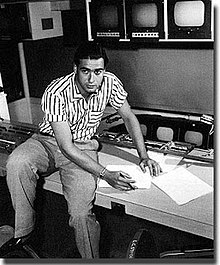 John FrankenheimerThrough the years, Frankenheimer had become known for his dynamic and creative style, both of which can be seen here. As an example, the sets for "Different Drummers" are open, without back walls [(nothing to keep the Union out?) and shrouded in darkness; in a particularly effective touch, images from the videophone calls are projected against the darkness, appearing to float in midair. And as for Frankenheimer’s dynamic directing style, Hayden, the newcomer to live television, freely admitted to being scared. "Frankenheimer loved to move the camera so fast. . . I went into one set to do a scene and there were no cameras! Then around the corner, like an old San Francisco fire truck, comes the camera on a dolly. And a guy comes along, puts up a light, and BANG, we go."
John FrankenheimerThrough the years, Frankenheimer had become known for his dynamic and creative style, both of which can be seen here. As an example, the sets for "Different Drummers" are open, without back walls [(nothing to keep the Union out?) and shrouded in darkness; in a particularly effective touch, images from the videophone calls are projected against the darkness, appearing to float in midair. And as for Frankenheimer’s dynamic directing style, Hayden, the newcomer to live television, freely admitted to being scared. "Frankenheimer loved to move the camera so fast. . . I went into one set to do a scene and there were no cameras! Then around the corner, like an old San Francisco fire truck, comes the camera on a dolly. And a guy comes along, puts up a light, and BANG, we go.""A Sound of Different Drummers" received generally favorable reviews from both critics and viewers (excepting Ray Bradbury, of course). Hayden received what he described as "among my first good notices," while The New York Times TV critic Jack Gould called it "the boldest and most stimulating" play of the season, an "intellectually compelling narrative", and "a powerful drama protesting the disease of conformity"; and the Hackensack Record found it "a stimulating plea for intellectual freedom." A dissenting view came from Mary Wood, the radio and television critic for the Cincinnati Post, who found the play "engrossing, if far-fetched," and added that Aurthur might have made more of an impact had he "made his imaginary society more believable." However, a viewer in Buckingham, Pennsylvania, writing to the Philadelphia Inquirer, countered that "We are in that rut NOW! Anyone with different ideas is frowned upon and made to feel like a pariah. All we need to make it complete is to dress in uniforms and live under a glass dome, like waxed flowers."
What I find interesting in perusing these contemporary reviews is the use of words like "intellectual" and "intellectual freedom," as if we’re talking about some specialized type of freedom, separate from and distinguishable from other types of freedom. And I think this is part of the point that Aurthur is trying to make. As one character asks of the Readers early on, "Why do you want to change things? We have everything so perfect." Early on, Gordon asks Susan rhetorically, "Who am I to tear up perfection? Look, we have World Union. There’s not a man living who remembers war. We have no crime: no crimes of passion because tranquilizers and analysts have wiped them out; no crimes for gain because everyone over there has what he wants or needs materially."
But, Susan corrects him, "There is one crime."
"There should be one crime," Gordon replies, "because the only people who can shake this world we live in are sick people with sick ideas. Now where do they get these ideas? They get them from books. Can you imagine what kind of world this would be if everyone read books? Why, we’d end up with a bunch of psychotics running around with destructive, non-conformist ideas." It isn’t that he wants to kill them, but "If a few psychotics have to die for the common good, then I have to do it in spite of the fact that I don’t like it."
In other words, Susan, says, the end justifies the means.
Yes, Gordon replies. "That’s a good phrase. I’ll have to remember it."
You might think we’d wizened up since then, but have we? After all, we embraced the Patriot Act because it promised us safety from terrorists, and what’s a little inconvenience in comparison to that? And when businesses were shut down during the Covid scare, when people were ordered to mask up and those in hospitals and care facilities were isolated from their friends and loved ones, we were reminded that it was only a little disruption, and it was for the common good, and what’s a little discomfort like wearing a mask when it comes to saving lives? Except when it comes to the loss of freedom, nothing is insignificant.
So was Mary Wood being short-sighted in calling Aurthur’s world "far-fetched"? Such critiques were common when it came to stories presenting such gloomy dystopian futures. Possibly she was speaking for the many Americans for whom the prospect of such a totalitarian state was unthinkable.
Perhaps, then, it’s not an issue of being short-sighted so much as it is an indication of how much and how quickly things have changed in the past decade or so.
III
The 1950s dramas that we’ve looked at are, without exception, products of Cold War thinking. A few of them, such as "Darkness at Noon" and "1984," are identifiably set during the Cold War, but all of them, no matter when they take place, are influenced by it.
Another thing: none of them actually feature any fighting to speak of; the war, if there was one, has already been fought and lost. Totalitarianism is no longer a threat but a reality, and so these stories, as well as being excellent vehicles for drama, are cautionary tales, warnings about the future that could happen if we’re not careful.
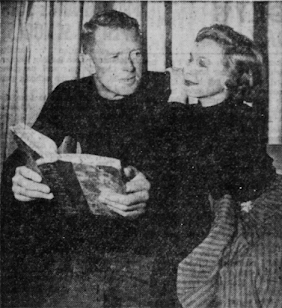 The San Bernardino County Sun called
The San Bernardino County Sun called "Different Drummers" "strange and thrilling" Don’t assume that they’re all part of some great right-wing propaganda effort, though, for there’s another Cold War theme running through many of these stories: a theme that, although it’s seldom voiced in the scripts, must be acknowledged in order to fully appreciate the context in which a story such as "A Sound of Different Drummers" was written: McCarthyism, what Aurthur referred to as the "dark days of democracy," days in which "nobody spoke up because his head could come off for this kind of talk." An era in which people were questioned about every association they’ve ever had, every organization they’ve ever belonged to, every person they’ve ever talked to, until the questioners could find a flaw in the façade, a weapon which they could use against the accused like a battering ram, until their reputation lies in tatters on the ground, and with it any semblance of whether or not the accusations were actually true.
Think of the questioning Gordon undergoes in front of the court, and later with Ellis. They make it all sound so reasonable. All he has to do is give them the names of the others in the cell. His own guilt will be wiped away—expunged from the record—and he and Susan will be free to go, with no ramifications. (Set aside the implausibility in this offer; I don’t think Gordon believes it for one second.) I’m positive anyone watching this at the time of broadcast would have instantly recognized this tactic from McCarthy and his House Un-American Activities Committee hearings. They might also have remembered the fate of the so-called Hollywood Ten: movie producers, directors, and screenwriters who appeared before HUAC, refused to answer questions or name names, and wound up serving time for contempt of Congress, after which they were blacklisted.
Just tell us the names of your fellow Readers. They would have called it being a "Friendly Witness."
Interestingly, and I wonder how much of this made it into his performance, Sterling Hayden had appeared before the House Un-American Activities Committee in 1951, owing to his brief membership in the Communist Party following the war, and became a Friendly Witness himself. It was a decision that Hayden regretted for the rest of his life. "If I have any excuse, and it's not a good reason," he told journalist Gerald Perry, "the FBI made it clear to me that if I became an 'Unfriendly Witness' I could damn well forget the custody of my children. I didn't want to go to jail, that was the other thing. The FBI office promised that my testimony was confidential. And they were very pleasant. So I spilled my guts out, and the months went by, and I was on some shit-ass picture, and I got a subpoena. The next thing I knew I was flying to Washington to testify. The worst day of my life. They knew it already, and there is the savage irony.” He was one of the most prominent namers of names in the industry; in his 1963 autobiography, he wrote, "I don't think you have the foggiest notion of the contempt I have had for myself since the day I did that thing."
During a 1958 round-table discussion on television drama, Aurthur cited "the collaboration between writers and actors" as an essential part of what makes for good television writing. "[A] great deal of changing goes on, and it is vitally important, because the whole intent of a production is to extend the original meaning of the script. . . It means simply taking the meaning and bringing it to life." It seems inconceivable, at least to me, that Hayden didn’t influence how that scene played out, beyond acting out the lines on the screen, as if it were a do-over for him. As, maybe, it was.
IV
The Smith Act of 1940 made it a crime to belong to an organization that advocated violent overthrow of the United States government. It was a law, that in the words of historian Larry Tye, outlawed "the advocacy of ideas rather than the commission of misdeeds." He cites the case of Junius Scales, an Army veteran who became a leader of the American Communist Party and was sentenced to six years in federal prison in 1954, not for his involvement in any plot but simply for being a member of an organization which advocated violence. (A description that would apply to several organizations in this day and age.) He was, writes Tye, "the only American ever imprisoned for merely belong to the Communist Party as opposed to participating in a violent or subversive activity"; it was, in fact, a longer sentence than anyone had ever received for actually committing an act of political violence or subversion. Later, the FBI would confirm that Scales’ real crime had been his refusal to name names of other former or present party members.
So much of what happens in "Different Drummers" sounds as if it could have been taken from today’s headlines; the lines spoken are too familiar to us. And has been the case so, so many times, it is driven by the fear which the ruling elite have for anyone who dares to think differently, to challenge authority, to question the status quo. And that, along with everything we’ve seen so far, got me to thinking.
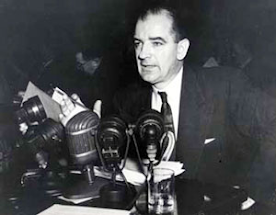 My college logic is a little worn, but I think I recall enough of it to propose the following: if the McCarthy era was the obvious source for the background atmosphere through which these stories are to be understood, and if we are finding them applicable to our day and time, then it would be reasonable to conclude that we are entering, have entered, a second McCarthy era, where one lives in fear from the ramifications of anything he or she might have said, might be saying, or might be thinking of saying. In short, you can’t say what you want. You’ll be labeled a racist, a Nazi, a hater; you’ll be accused of using the wrong pronouns. And then you’ll be shunned by polite society, and anything of merit that you might have said or done in the past will simply be forgotten. You’ll find yourself removed from the picture, just as the Soviets used to do in the case of party functionaries who’d fallen into disgrace or disfavor. Only now it's even easier than it was then; you don’t require any special photograph editing skills, only a finger to press a button on a computer, and it’s all over.
My college logic is a little worn, but I think I recall enough of it to propose the following: if the McCarthy era was the obvious source for the background atmosphere through which these stories are to be understood, and if we are finding them applicable to our day and time, then it would be reasonable to conclude that we are entering, have entered, a second McCarthy era, where one lives in fear from the ramifications of anything he or she might have said, might be saying, or might be thinking of saying. In short, you can’t say what you want. You’ll be labeled a racist, a Nazi, a hater; you’ll be accused of using the wrong pronouns. And then you’ll be shunned by polite society, and anything of merit that you might have said or done in the past will simply be forgotten. You’ll find yourself removed from the picture, just as the Soviets used to do in the case of party functionaries who’d fallen into disgrace or disfavor. Only now it's even easier than it was then; you don’t require any special photograph editing skills, only a finger to press a button on a computer, and it’s all over.Anyone who doubts the existence of a new McCarthy era has only to look at the number of people who’ve been cancelled in the last few years: shamed in their professions, ostracized by their colleagues, fired by their employer, canceled by their bank, silenced by social media, dropped by their friends.
Back then, it was called "Blacklisting." Today, it’s called "Cancel Culture." Back then, the dreaded word was "Communist." Today, it’s "homophobe," "climate denier," "anti-vaxxer," "Christian."
V
So in addition to banning books and blacklisting, what else is on the agenda for Aurthur’s far-fetched government of tomorrow?
At one point Gordon marvels at how Susan is like nobody he’s ever known. For instance, at their first meeting, he mentions how his partner had told him about her beautiful smile. "People don’t smile much, do they?" he says. "That’s a dangerous statement," she replies. When he asks her what makes it dangerous, she answers, "If you say that people don’t smile, you might conclude that people aren’t happy." And that simply wouldn’t do in a prefect society, would it?
Later, while enjoying a picnic outside the domed city (nature itself being a revelation to Gordon), Susan notes how they have such different ways of looking at things. Gordon views the domed city as perfect, safe, secure. To Susan, however, it’s a prison, where the people are kept in ignorance. "In the old days people were afraid of the dark, she says. Nowadays we live in darkness so we’re afraid of the light."
How, he wonders, did she come to be like this, to have these thoughts that are so different, so unlike any he’s ever heard before? She begins to tell him about her childhood, an unusual one it that she spent it with her parents, something that is strictly forbidden today. "The Union didn’t catch up with us until I was eight."
"No wonder you’re different," Gordon says, mirroring the accepted attitude. "That’s a pretty unhealthy start. Before the Union took over the raising of infants all neuroses in children were caused by parents. It’s a scientific fact. A child raised by parents has to grow up disturbed."
But, she asks, didn’t he ever want to know who his parents were? At first, he dismisses such thoughts as idle curiosity, but then he corrects himself. "I would like to find them. But that comes under the heading Treasonous Thoughts." He thinks back to the old couple he killed for being Readers. "They could have been my mother and father. Every time I go on a raid, I could kill them and not know it. I look in the faces of people and wonder. Are these my parents? Do I have siblings? Do they think about me, do they love me? I’ve killed over 100 people. Could have been my parents, my sister, my brother? It’s like killing myself."
I suppose that’s a pretty far-fetched idea, that the Union should raise all infants. And yet today we see increasing arguments about the role that parents should play in the lives of their children. Liberal activists accuse parents of spreading hate and ignorance, teaching their children the "wrong" ideas, of preventing them from getting a “complete education.” In some states, minor children might be able to get an abortion without telling their parents. School districts seek to block parents from knowing "whether their child identifies as a different gender in the classroom," and organizations provide schools with training and materials on how to secretly transition students. Teachers’ unions fight to prevent parents from having input in the school curriculum; the late educator John Goodlad once said that "Parents do not own their children. They have no ‘natural right’ to control their education fully." The President claims that “school children don’t belong to parents 'when they’re in the classroom.'" Meanwhile, federal agencies move to remove words like "mother" and "father" from childcare laws.
As we saw in "The Children’s Story," there’s a thin line between educating and brainwashing, one that seems to get more and more faint every day. The Native American activist Wilma Mankiller said "Whoever controls the education of our children controls the future." Don’t think that the government and the education industry doesn’t know that. And as for those parents old-fashioned enough to think that they, and not the schools, know what’s best for their children, "If the older generation cannot get accustomed to us, we shall take their children away from them and rear them as needful."
That last quote came from Hitler, by the way.
VI
"I hardly know an intellectual man, even, who is so broad and truly liberal that you can think aloud in his society." ―Henry David Thoreau
One of the things about revolutionaries is that you; can seldom trust them to remain true to their ideals once they’ve achieved their goals. To underline this, Gordon quotes Friedrich Nietzsche in one scene, that "Liberal institutions straightaway cease from being liberal the moment they are soundly established. Once this is obtained, no more grievous and more thorough enemy of freedom exists than liberal institutions."*
*The actual quote, from Twilight of the Idols, reads, "Liberal institutions cease to be liberal as soon as they are attained: later on, there are no worse and no more thorough injurers of freedom than liberal institutions." Nietzsche continues, "One knows, indeed, what their ways bring: they undermine the will to power; they level mountain and valley, and call that morality; they make men small, cowardly, and hedonistic—every time it is the herd animal that triumphs with them. Liberalism: in other words, herd-animalization."
 Gordon discovers the truth of this in his initial meeting with the other members of the Readers cell. After Ellis explains the group’s philosophy, talking about how extraordinary individualism is, he tells Gordon, "We think of ourselves not as criminals, but simply as people who hear different drummers. We’d like you to be with us, Gordon."
Gordon discovers the truth of this in his initial meeting with the other members of the Readers cell. After Ellis explains the group’s philosophy, talking about how extraordinary individualism is, he tells Gordon, "We think of ourselves not as criminals, but simply as people who hear different drummers. We’d like you to be with us, Gordon." "Then there’d be no turning back," Gordon replies.
"Can you turn back now?" Ellis asks.
After Gordon tells Ellis he’s with them, Ellis then reveals that, had Gordon said no, Ellis would have had to have Gordon shot. "We have to be a little ruthless too, Gordon."
"How does that make you any different from them?" Gordon asks.
"That’s one of those vast complications we’ll discuss later," Ellis says.
From a purely tactical viewpoint, this makes perfect sense. In wartime, maintaining the integrity of such an organization’s security is paramount; the success of its mission and the very lives of its members depends on it. For Gordon, however, it exposes another side of the Readers: a willingness to use tactics similar to those of the State.
Ellis’s "complications" become yet more complicated after Ellis has been revealed as chief judge of the court. Yes, Ellis tells Gordon, Susan is safe—but the court still wants those names. "Gordon, they’re very frightened men, don’t you understand that? A society so rigid that when it goes, it goes smash. You confound them, Gordon, you confuse them. Tiny cracks. They must let you talk or kill you."
Despondent and worn out, Gordon bluntly asks Ellis what he should do. Ellis gives him one option: you can answer their questions. Gordon is shocked by Ellis’s attitude, but Ellis provides him with a rationalization: "If you talk, twelve people will die, but they would eventually die anyway. What would they be? Victims of cruelty, certainly not the first and maybe not the last." And when Gordon wearily points out that as a Bookman he’s already killed over a hundred people, Ellis replies, "Twelve more. What difference would it make?"
Has Ellis been a wolf in sheep’s clothing all along, trying to trick Gordon by giving him “permission” to name names? Or does he have something else in mind? Having presented Gordon with an option he must have known Gordon would never accept, could never accept, he offers an alternative: accepting death. But not just any death—his death will be an act of martyrdom, a death that means something. "Your death will widen the crack maybe just enough that it will smash it. And when it falls, I will be there. Susan will be there. The twelve you don’t name will be there. If not us our children. Gordon, if you die silent, you will be the first the people will hear. I promise you that. They’ll hear of the bookman reader who died for his ideals."
But, as Gordon knows, it’s much easier to talk up the nobility of martyrdom when you’re not the one doing the dying. Yes, he’ll remain silent, ensuring his death. "But not for your reasons. Not because of hope or because of faith. I just can’t kill anymore. I can’t be responsible for twelve more people dying," he tells Ellis. "You want me to believe my death will be something normal, You talk about ideals. You talk about people knowing. You want it to seem big and normal that I’d die for ideals. Howard, there’s nothing big and noble about a man dying. I’ve seen over a hundred people die. A man dies alone, in the dark." It’s as simple as that; I just can’t kill any more.
Not, however, before Gordon asks Ellis one final question. "You used the word ruthless," he says, thinking back to when Ellis was prepared to have him killed if he hadn’t joined the Readers. "What does happen, Howard, when you are soundly established?"
"I don’t know, Gordon," Ellis replies quietly.
VII
So what, exactly, was Ellis’s game there? Is he hero or villain, freedom fighter or strongman-in-waiting? I suppose it doesn’t matter in the end, at least not in "A Sound of Different Drummers." Gordon’s story ends, with his and Ben’s executions, and our story ends with them.
One could, however, speculate that Ellis intentionally set up Gordon: studied his records and found where he was vulnerable, made sure Ben introduced him to Susan, had him recruited into the Readers, arranged for his arrest, made himself chief judge at the trial, manipulated Gordon into being the martyr that the movement desperately needed in order to grow. That’s Machiavellian to the nth degree, and I'm almost ashamed I could think of something that cynical, but it’s undeniable that Gordon was more useful to him dead than alive. Yes, it’s true that Ellis put together an escape plan for Gordon and Susan, and that could have been his way of warning Gordon that he was in trouble without blowing his own cover, but I wonder if Ellis was ever sincere about anything, including the entire Reader movement in the first place. For all we know, Ellis is just another politician, the flip side of the very coin minted by the World Union.
 In a way, though, that uncertainty itself is the real weapon—the infiltration of organizations by officials of the government, the next-door neighbors and co-workers who may be on the spymaster’s payroll, question of who you can trust. That kind of mutual mistrust prevents people from getting together, from comparing notes, from taking action. As Gordon says, "They've broken us down so that alone we're afraid. Alone we’re helpless. You know, I hope we can exist because we’re always in groups, we're never alone. The great crimes of history can only have been committed by groups. Whether they're people hiding under hoods or with swastikas on the arms or wearing Bookmen’s uniforms."
In a way, though, that uncertainty itself is the real weapon—the infiltration of organizations by officials of the government, the next-door neighbors and co-workers who may be on the spymaster’s payroll, question of who you can trust. That kind of mutual mistrust prevents people from getting together, from comparing notes, from taking action. As Gordon says, "They've broken us down so that alone we're afraid. Alone we’re helpless. You know, I hope we can exist because we’re always in groups, we're never alone. The great crimes of history can only have been committed by groups. Whether they're people hiding under hoods or with swastikas on the arms or wearing Bookmen’s uniforms." Or governments isolating us from our loved ones, ordering us to hide our identities behind masks, making us suspect those standing next to us, living next door, people we though were our friends?
You might remember, for instance, the story from a while back about the FBI supposedly attempting to infiltrate traditional Catholic organizations under the pretense of them being extremist groups? Or the Covid-snitches who ratted out those who violated the lockdown rules, who might—horrors—have invited some friends over without having them separated by the proper distance. "Get vaccinated for others," they said; "It’s for the common good."
I keep coming back to Mary Wood’s review in the Cincinnati Post and her comments about Aurthur’s "far-fetched" world, a world in which ;so many things have come true. Would she have found my theory about Ellis a far-fetched one? Would anyone, viewing "A Sound of Different Drummers" back in 1957, have attributed to him such devious motives?
I’ll allow as to how I can be pretty cynical when it comes to that, but I can’t imagine that this would be any more implausible than, say, undermining the stability of a country for personal and political gain. Let’s suppose—just for the sake of argument, you understand—that a candidate for high office started a movement, one that eventually came to comprise millions of his followers, so popular that it was known just by its initials.
Now, suppose he were to find his poll numbers down, his fundraising running low, his leadership challenged by others in the party: wouldn’t it be in his best interests to suggest that he and his followers were so dangerous to the establishment that they were being targeted? It would help if some of those followers were arrested, too; that way they’d become the perfect martyrs, much more valuable than if they were mere voters. Even if he was indicted himself, he’d gain publicity, he’d galvanize his supporters, he could even raise money off it. If I were him, I’d make damn sure that’s what happened. Even if I had to make it happen myself.
Just my imagination, of course. And as I said, I’m cynical. But then, admit it—so are you.
And if we’ve become that much more cynical since 1957, if circumstances have manipulated us to feel that way—well, really, whose fault is that? TV
Published on October 04, 2023 05:00
October 2, 2023
What's on TV? Tuesday, October 3, 1972

 We're back in Atlanta this week as part of the Georgia Edition, back in the pre-Superstation days when WTCG stood for "Turner Communications Group." In 1972, Channel 17 has only been on the air for five years (the local story was that WTCG stood for "Watch This Channel Grow"), but I think you can already see the seeds of what it would become in its Superstation days (minus the Braves games, of course). Now, it goes under the call letters of WPCH, and is known as "Peachtree TV." All good things come to an end, I guess. Also, if you were wondering, that "Woodruff" that's one of the anchors on WAGA is, in fact, Judy Woodruff, who will go on to much bigger and better things in her broadcasting career. Check out the rest of the listings and see what other hidden facts you can find this week!
We're back in Atlanta this week as part of the Georgia Edition, back in the pre-Superstation days when WTCG stood for "Turner Communications Group." In 1972, Channel 17 has only been on the air for five years (the local story was that WTCG stood for "Watch This Channel Grow"), but I think you can already see the seeds of what it would become in its Superstation days (minus the Braves games, of course). Now, it goes under the call letters of WPCH, and is known as "Peachtree TV." All good things come to an end, I guess. Also, if you were wondering, that "Woodruff" that's one of the anchors on WAGA is, in fact, Judy Woodruff, who will go on to much bigger and better things in her broadcasting career. Check out the rest of the listings and see what other hidden facts you can find this week!-2- WSB (ATLANTA) (NBC) MORNING 6:20 TOWN AND COUNTRY 6:25 FARM NEWS 6:30 PATTERN FOR LIVING 7:00 TODAY 9:00 TODAY IN GEORGIA 10:00 DINAH SHORE Guest: Peter Marshall 10:30 CONCENTRATION 11:00 SALE OF THE CENTURY 11:30 HOLLYWOOD SQUARES Michael Landon, Vicki Lawrence, Rose Marie, George Maharis, Carl Reiner, Karen Valentine, Demond Wilson AFTERNOON 12:00 NEWS—Sisson/Lane 12:30 MERV GRIFFIN Guests: Andy Griffith, Della Reese, Rose Marie 2:00 DAYS OF OUR LIVES 2:30 DOCTORS 3:00 ANOTHER WORLD 3:30 RETURN TO PEYTON PLACE 4:00 SOMERSET 4:30 TRUTH OR CONSEQUENCES—Game 5:00 PERRY MASON BW EVENING 6:00 NEWS—Philp/Sisson 7:00 NBC NEWS—John Chancellor 7:30 WILD KINGDOM 8:00 BONANZA 9:00 BOLD ONES 10:00 FIRST TUESDAY Special 11:00 NEWS—Horner/Philp 11:30 JOHNNY CARSON Guest: Rodney Dangerfield 1:00 NEWS
3 WRCB (CHATTANOOGA) (NBC) MORNING 7:00 TODAY 9:00 MAYBERRY R.F.D. 9:30 I DREAM OF JEANNIE 10:00 DINAH SHORE Guest: Peter Marshall 10:30 CONCENTRATION 11:00 SALE OF THE CENTURY 11:30 HOLLYWOOD SQUARES Michael Landon, Vicki Lawrence, Rose Marie, George Maharis, Carl Reiner, Karen Valentine, Demond Wilson AFTERNOON 12:00 JEOPARDY 12:30 WHO, WHAT OR WHERE—Game 12:55 NBC NEWS—Floyd Kalber 1:00 MERRY-GO-ROUND 1:20 LUCILLE RIVERS—Sewing 1:30 THREE ON A MATCH 2:00 DAYS OF OUR LIVES 2:30 DOCTORS 3:00 ANOTHER WORLD 3:30 RETURN TO PEYTON PLACE 4:00 SOMERSET 4:30 MOVIE—Drama BW “Hot Rods to Hell” (1967) EVENING 6:00 NEWS—Morris/Wick 6:30 NBC NEWS—John Chancellor 7:00 TRUTH OR CONSEQUENCES—Game 7:30 ADAM-12 8:00 BONANZA 9:00 MOVIE—Comedy “The Wheeler Dealers” (1963) 11:00 NEWS—Wick/Wilson 11:30 JOHNNY CARSON Guests: Buddy Rich, Sandy Duncan
-5- WAGA (ATLANTA) (CBS) MORNING 6:00 SUNRISE SEMESTER 20th-Century American Art: The Realists 6:30 UNIV. OF MICHIGAN 7:00 CBS NEWS—Hart 8:00 WHAT’S NEW 9:00 PHIL DONAHUE Guest: Laura Nader 10:00 JOKER’S WILD—Game 10:30 PRICE IS RIGHT 11:00 GAMBIT—Game 11:30 LOVE OF LIFE AFTERNOON 12:00 NEWS—Axel/Woodruff 12:30 SEARCH FOR TOMORROW 1:00 IT’S YOUR BET 1:30 AS THE WORLD TURNS 2:00 GUIDING LIGHT 2:30 EDGE OF NIGHT 3:00 LOVE IS A MANY SPLENDORED THING 3:30 SECRET STORM 4:00 VIRGINIAN 5:30 I DREAM OF JEANNIE EVENING 6:00 NEWS—Chuck Moore/Woodruff 6:30 CBS NEWS—Walter Cronkite 7:00 NEWS—Axel/Ray Moore 7:30 WAIT TILL YOUR FATHER GETS HOME 8:00 MAUDE—Comedy 8:30 HAWAII FIVE-O 9:30 MOVIE—Drama “Footsteps” (Made-for-TV; 1972) 11:00 NEWS—Chuck Moore 11:30 MOVIE—Biography BW “The Stratton Story” (1949)
-8- WGTV (ATLANTA) (PBS) AFTERNOON 4:00 SESAME STREET Guest: Burt Lancaster 5:00 MISTER ROGERS’ NEIGHBORHOOD Guest: Captain Kangaroo 5:30 ELECTRIC COMPANY EVENING 6:00 SESAME STREET 7:00 TV HIGH SCHOOL BW 7:30 FIRING LINE Guest: Jimmy Hoffa 8:30 DATELINE AMERICA—Documentary Debut 9:00 NORMAN CORWIN PRESENTS “You Think You’ve Got Troubles?” 9:30 INSIDE ATLANTA 10:00 GEORGIA MOUNTAIN FAIR
9 WTVC (CHATTANOOGA) (ABC) MORNING 7:00 COUNTRY MUSIC 7:30 NEW ZOO REVUE—Children 8:00 FUNTIME—Children 9:00 NEWS—Hogue/Mazza 9:30 VIRGINIAN 11:00 NOT FOR WOMEN ONLY 11:30 BEWITCHED AFTERNOON 12:00 PASSWORD Elizabeth Montgomery, Richard Long 12:30 SPLIT SECOND—Game 1:00 ALL MY CHILDREN 1:30 LET’S MAKE A DEAL 2:00 NEWLYWED GAME 2:30 DATING GAME 3:00 GENERAL HOSPITAL 3:30 ONE LIFE TO LIVE 4:00 LOVE, AMERICAN STYLE 4:30 GREEN ACRES 5:00 PONDEROSA EVENING 6:00 NEWS—Willette/McAffee 6:30 ABC NEWS—Howard K. Smith, Harry Reasoner 7:00 LAWRENCE WELK 8:00 TEMPERATURES RISING—Comedy 8:30 MOVIE—Comedy “Playmates” (Made-for-TV; 1972) 10:00 MARCUS WELBY, M.D. 11:00 NEWS—Willette/McAffee 11:30 DICK CAVETT Guest: Lana Cantrell
11 WQXI (ATLANTA) (ABC) MORNING 6:30 EDUCATIONAL FILM BW 7:00 CARTOON CLUB 8:30 MY FAVORITE MARTIAN BW 9:00 HAZEL 9:30 DICK VAN DYKE BW 10:00 COURTSHIP OF EDDIE’S FATHER 10:30 LOVE, AMERICAN STYLE 11:00 PASSWORD Martin Milner, Greg Morris 11:30 BEWITCHED AFTERNOON 12:00 NEWS—Becker/Neal 12:20 LUCILLE RIVERS—Sewing 12:30 SPLIT SECOND—Game 1:00 ALL MY CHILDREN 1:30 LET’S MAKE A DEAL 2:00 NEWLYWED GAME 2:30 DATING GAME 3:00 GENERAL HOSPITAL 3:30 MOVIE—Drama BW “Autumn Leaves” (1956) 5:00 PONDEROSA EVENING 6:00 NEWS—Dominic/Scott/Neal 6:30 ABC NEWS—Howard K. Smith, Harry Reasoner 7:00 WHAT’S MY LINE? 7:30 TO TELL THE TRUTH 8:00 NORM VAN BROCKLIN 8:30 MOVIE—Comedy “Playmates” (Made-for-TV; 1972) 10:00 MARCUS WELBY, M.D. 11:00 NEWS—Dominic/Scott/Neal 11:40 MOVIE—Drama BW “The Lineup” (1958) 1:00 NEWS
12 WDEF (CHATTANOOGA) (CBS) MORNING 6:25 SUNRISE SEMESTER 20th-Century American Art: The Realists 6:55
FARM REPORT 7:00 CBS NEWS—Hart 7:30 MORNING SHOW 8:30 ROMPER ROOM 9:00 CAPTAIN KANGAROO 10:00 JOKER’S WILD—Game 10:30 PRICE IS RIGHT 11:00 GAMBIT—Game 11:30 LOVE OF LIFE AFTERNOON 12:00 NEWS—Don Allen 12:20 PAUL HARVEY—Commentary 12:25 CBS NEWS—Edwards 12:30 SEARCH FOR TOMORROW 1:00 BEAT THE CLOCK 1:30 AS THE WORLD TURNS 2:00 GUIDING LIGHT 2:30 EDGE OF NIGHT 3:00 LOVE IS A MANY SPLENDORED THING 3:30 SECRET STORM 4:00 FAMILY AFFAIR 4:30 MERV GRIFFIN The Don Adamses, Ross Martins, Willie Shoemakers, Leslie Uggams and her husband EVENING 6:00 NEWS—Mort Lloyd 6:30 CBS NEWS—Walter Cronkite 7:00 DRAGNET 7:30 TO TELL THE TRUTH 8:00 MAUDE—Comedy 8:30 HAWAII FIVE-O 9:30 MOVIE—Drama “Footsteps” (Made-for-TV; 1972) 11:00 NEWS—Dick James 11:30 MOVIE—Biography BW “The Stratton Story” (1949)
13 WMAZ (MACON) (CBS, ABC) MORNING 6:50 NEWS 7:00 CBS NEWS—Hart 8:00 CAPTAIN KANGAROO 9:00 LET’S TALK IT OVER 9:30 GENERAL HOSPITAL 10:00 JOKER’S WILD—Game 10:30 PRICE IS RIGHT 11:00 GAMBIT—Game 11:30 LOVE OF LIFE AFTERNOON 12:00 WHERE THE HEART IS 12:25 CBS NEWS—Edwards 12:30 SEARCH FOR TOMORROW 1:00 ALMANAC 1:15 DATE WITH DEL 1:30 AS THE WORLD TURNS 2:00 GUIDING LIGHT 2:30 EDGE OF NIGHT 3:00 LOVE IS A MANY SPLENDORED THING 3:30 SECRET STORM 4:00 FAMILY AFFAIR 4:30 PONDEROSA 5:30 TO TELL THE TRUTH EVENING 6:00 NEWS, SPORTS, WEATHER 6:30 CBS NEWS—Walter Cronkite 7:00 TRUTH OR CONSEQUENCES—Game 7:30 ODD COUPLE 8:00 MAUDE—Comedy 8:30 HAWAII FIVE-O 9:30 MOVIE—Drama “Footsteps” (Made-for-TV; 1972) 11:00 NEWS, SPORTS, WEATHER 11:30 MOVIE—Biography BW “The Stratton Story” (1949)
15 WDCO (COCHRAN) (PBS) MORNING 8:30 WHAT’S NEW 9:00 ELECTRIC COMPANY AFTERNOON 4:00 SESAME STREET Guest: Burt Lancaster 5:00 MISTER ROGERS’ NEIGHBORHOOD Guest: Captain Kangaroo 5:30 ELECTRIC COMPANY EVENING 6:00 SESAME STREET 7:00 TV HIGH SCHOOL BW 7:30 SOUND OF YOUTH 8:00 FAMILY GAME—Discussion Debut 8:30 DATELINE AMERICA—Documentary Debut 9:00 BEHIND THE Debut 9:30 BLACK JOURNAL Return 10:00 GEORGIA MOUNTAIN FAIR
17 WTCG (ATLANTA) (Ind.) MORNING 7:00 LITTLE RASCALS BW 8:00 BANANA SPLITS 8:30 MAGIC FUNNIES 9:00 NEW ZOO REVUE—Children 9:30 ROMPER ROOM 10:00 CARTOON CARNIVAL 10:30 JACK LaLANNE 11:00 GALLOPING GOURMET Shrimp with tomato sauce 11:30 MIKE DOUGLAS Guests: Zsa Zsa Gabor, Lionel Hampton, William Putney AFTERNOON 1:00 MOVIE—Mystery BW “Uncle Harry” (1945) 3:00 BANANA SPLITS 3:30 FLINTSTONES 4:00 LEAVE IT TO BEAVER BW 4:30 PETTICOAT JUNCTION 5:00 ANDY GRIFFITH BW 5:30 GET SMART EVENING 6:00 STAR TREK 7:00 RIFLEMAN BW 7:30 ANDY GRIFFITH BW 8:00 MOVIE—Comedy BW “Horse Feathers” (1932) 9:30 WACKY WORLD OF JONATHAN WINTERS Guest: Joseph Campanella 10:00 ROLLIN’—Variety 10:30 GOLDDIGGERS Guest: Don Meredith 11:00 AVENGERS BW 12:00 MOVIE—Mystery BW “Uncle Harry” (1945)
18 WCLP (CHATSWORTH) (PBS) MORNING 8:30 WHAT’S NEW 9:00 ELECTRIC COMPANY AFTERNOON 4:00 SESAME STREET Guest: Burt Lancaster 5:00 MISTER ROGERS’ NEIGHBORHOOD Guest: Captain Kangaroo 5:30 ELECTRIC COMPANY EVENING 6:00 SESAME STREET 7:00 TV HIGH SCHOOL BW 7:30 SOUND OF YOUTH 8:00 FAMILY GAME—Discussion Debut 8:30 DATELINE AMERICA—Documentary Debut 9:00 BEHIND THE Debut 9:30 BLACK JOURNAL Return 10:00 GEORGIA MOUNTAIN FAIR
30 WETV (ATLANTA) (PBS) MORNING 10:00 SESAME STREET Guest: Burt Lancaster AFTERNOON 2:30 ELECTRIC COMPANY 4:00 SESAME STREET Guest: Burt Lancaster 5:00 MISTER ROGERS’ NEIGHBORHOOD Guest: Captain Kangaroo 5:30 ELECTRIC COMPANY EVENING 6:00 FILM 6:30 HODGEPODGE LODGE 7:00 HERE AND NOW BW 7:30 OTHER PEOPLES, OTHER VIEWPOINTS BW 8:00 FAMILY GAME—Discussion Debut 8:30 DATELINE AMERICA—Documentary Debut 9:00 BEHIND THE Debut 9:30 HOLLYWOOD TELEVISION THEATRE Special: “Another Part of the Forest”
41 WCWB (MACON) (NBC) MORNING 7:00 TODAY 9:00 ROMPER ROOM 9:30 WHAT EVERY WOMAN WANTS TO KNOW 10:00 DINAH SHORE Guest: Peter Marshall 10:30 CONCENTRATION 11:00 SALE OF THE CENTURY 11:30 HOLLYWOOD SQUARES Michael Landon, Vicki Lawrence, Rose Marie, George Maharis, Carl Reiner, Karen Valentine, Demond Wilson AFTERNOON 12:00 JEOPARDY 12:30 WHO, WHAT OR WHERE—Game 12:55 NBC NEWS—Floyd Kalber 1:00 NEWS—McEldowney 1:10 WOMEN’S WORLD 1:30 THREE ON A MATCH 2:00 DAYS OF OUR LIVES 2:30 DOCTORS 3:00 ANOTHER WORLD 3:30 RETURN TO PEYTON PLACE 4:00 SOMERSET 4:30 MOVIE—Western BW “Battle—Texas Style” EVENING 6:30 NBC NEWS—John Chancellor 7:00 REAL McCOYS BW 7:30 FELONY SQUAD 8:00 BONANZA 9:00 BOLD ONES 10:00 FIRST TUESDAY Special 11:00 WESTERN STAR THEATRE 11:30 JOHNNY CARSON Guest: Rodney Dangerfield
45 WTCI (CHATTANOOGA) (PBS) MORNING 8:30 MISTER ROGERS 10:00 SESAME STREET Guest: Burt Lancaster 11:00 ELECTRIC COMPANY AFTERNOON 5:00 MISTER ROGERS’ NEIGHBORHOOD Guest: Captain Kangaroo 5:30 ELECTRIC COMPANY EVENING 6:00 SESAME STREET 7:00 HODGEPODGE LODGE 7:30 IMPROVING YOUR MATH BW 8:00 YOU! 8:30 DATELINE AMERICA—Documentary Debut 9:00 BEHIND THE Debut 9:30 AESTHETIC VENTURE 10:00 MATH 1110
46 WHAE (ATLANTA) (Ind.) AFTERNOON 3:30 THIS IS THE LIFE BW 4:00 INSIGHT—Drama 4:30 FURY BW 5:00 DAVEY AND GOLIATH 5:30 DENNIS THE MENACE BW EVENING 6:00 JIM AND TAMMY 7:00 OF LANDS AND SEAS 8:00 WARREN ROBERTS 9:00 700 CLUB 10:00 700 CLUB
61 WRIP (CHATTANOOGA) (Ind.) AFTERNOON 3:30 CARTOONS/THREE STOOGES EVENING 6:00 MOVIE—Adventure BW “The Charge of the Light Brigade” (1936) 8:00 MOVIE—Melodrama BW “Flaxy Martin” (1949) 10:00 MOVIE—Drama BW “Flight Angels” (1940) 11:30 MOVIE—Biography BW “Knute Rockne—All American” (1940)
TV
Published on October 02, 2023 05:00
September 30, 2023
This week in TV Guide: September 30, 1972

 We—and by that I mean you and me and everyone else who watches television—complain a lot about what's on, but rarely do we discuss the shows that almost made it to our home screens. Sure, we may seem some of them in the "Failed-Pilot Playhouse" anthologies that used to populate the summer months, but what about those pilots that were really good, did well in the ratings, scored big in the corporate boardroom, and seemed to be a sure thing to make it to the fall schedule—until they didn't? That's what Dick Adler's looking at this week.
We—and by that I mean you and me and everyone else who watches television—complain a lot about what's on, but rarely do we discuss the shows that almost made it to our home screens. Sure, we may seem some of them in the "Failed-Pilot Playhouse" anthologies that used to populate the summer months, but what about those pilots that were really good, did well in the ratings, scored big in the corporate boardroom, and seemed to be a sure thing to make it to the fall schedule—until they didn't? That's what Dick Adler's looking at this week. Jim Hutton and Connie StevensFor instance, have you heard of Call Her Mom, a sitcom starring Connie Stevens and Jim Hutton? The story of a beautiful young woman who becomes a frat house-mother, was last season's highest-rated pilot movie, and yet ABC "never really looked at it as a series," according to producer Doug Cramer, who points out that CBS took The Homecoming—"which wasn't intended to be a pilot, just a television special"—and made it into The Waltons. Says Cramer, "You figure it out." One unnamed source reports that the reason it didn't make the cut was because a top network executive "just doesn't like Connie Stevens." It sounds to me as if it would have been perfect ABC fodder.
Jim Hutton and Connie StevensFor instance, have you heard of Call Her Mom, a sitcom starring Connie Stevens and Jim Hutton? The story of a beautiful young woman who becomes a frat house-mother, was last season's highest-rated pilot movie, and yet ABC "never really looked at it as a series," according to producer Doug Cramer, who points out that CBS took The Homecoming—"which wasn't intended to be a pilot, just a television special"—and made it into The Waltons. Says Cramer, "You figure it out." One unnamed source reports that the reason it didn't make the cut was because a top network executive "just doesn't like Connie Stevens." It sounds to me as if it would have been perfect ABC fodder.Then there was Fireball Forward, which I actually do remember. The movie starred Ben Gazzara as a tough, unorthodox World War II general, was produced by Patton's Frank McCarthy, and had thousands of feet of battle footage from both Patton and Tora! Tora! Tora! It was pretty good; even though it did come across as something of a lower-budget version of Patton. In this case, the problem wasn't the network, it was Gazzara. "Ben went into the movie without an option on his services for a series," says McCarthy. "He loved the script but didn't want to be committed." Rock Hudson (McMillan) and Anthony Quinn (The Man and the City) were of similar dispositions, but did their series "when the big money was dangled in front of them." Not so for Gazzara; "No matter what we dangled, Ben wouldn't agree—and ABC just wouldn't do the series without him." I wonder what the spin would have been on it, having had to maneuver through the tangled legacy of Vietnam.
 Robert Conrad's Nick Carter, with
Robert Conrad's Nick Carter, withShelley WintersAnd so the stories go. Fitzgerald and Pride, a legal drama, started out with James Stacey and Barbara Stanwyck at the helm; when Stanwick fell ill, Susan Hayward stepped in. It got solid reviews and ratings, and supposedly CBS felt it was a toss-up between Fitzgerald and Pride and the aformentioned The Waltons. Personally, I think they should have gone the other way, but what do I know? ABC looked closely at a wheel series called The Great Detectives, which would have starred Robdert Conrad as Nick Carter, Stuart Granger as Sherlock Holmes, and Eve Arden as Hildegarde Withers. That sounds like a winner, but the network worried that viewers wouldn't go for the British background in Holmes, and that the Hildegarde Withers stories were contemporary instead of period pieces. And yet, the Nick Carter segment, which almost made it on its own, was killed because it was a period piece—New York at the turn of the century. Conrad wound up on Assignment: Vienna instead.
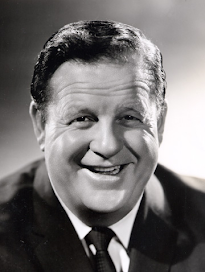 Alex Dreier from NemtinThe satiric program This Week in Nemtin came very close; it was "virtually a 30-minute ethnic joke, done as a newscast from a mythical, slightly dumb country" starring Alex Dreier (a real-life news announcer) as the anchor, and Carl Reiner, Ed Asner, and McLean Stevenson as others in the cast. The response was very positive, and it nearly made it onto the second season schedule as a replacement for Sandy Duncan's show when she became ill, but lost out to Me and the Chimp. Then the network passed on it for fall, saying it would work better as a mid-season replacement. Co-creater Saul Turtletaub says its best chance is probably in first-run syndication. The sitcom Wednesday Night Out even made it to the early fall schedules on NBC; directed by Jerry Paris, it featured Jim Hutton, Pat Harrington, and Gloria DeHaven in a tale about "four diverse couples who meet weekly at one another's homes for an evening of fun and bigotry." It apparently fell victim to the FCC's Prime Time Access Rule giving a half-hour back to the affiliates. I don't know if the show would have been any good, but that FCC access ruling remains idiotic.
Alex Dreier from NemtinThe satiric program This Week in Nemtin came very close; it was "virtually a 30-minute ethnic joke, done as a newscast from a mythical, slightly dumb country" starring Alex Dreier (a real-life news announcer) as the anchor, and Carl Reiner, Ed Asner, and McLean Stevenson as others in the cast. The response was very positive, and it nearly made it onto the second season schedule as a replacement for Sandy Duncan's show when she became ill, but lost out to Me and the Chimp. Then the network passed on it for fall, saying it would work better as a mid-season replacement. Co-creater Saul Turtletaub says its best chance is probably in first-run syndication. The sitcom Wednesday Night Out even made it to the early fall schedules on NBC; directed by Jerry Paris, it featured Jim Hutton, Pat Harrington, and Gloria DeHaven in a tale about "four diverse couples who meet weekly at one another's homes for an evening of fun and bigotry." It apparently fell victim to the FCC's Prime Time Access Rule giving a half-hour back to the affiliates. I don't know if the show would have been any good, but that FCC access ruling remains idiotic.So this is our story of what might-have-been. It's possible that television history could have been changed by any or all of these series, had they been picked up. The shows themselves could have been smashes, or it might have been the case that their existance meant that another show—The Waltons, for example—would have missed out. And what would Mary Tyler Moore have been like without Ed Asner, or M*A*S*H without McLean Stevenson, if they'd both been off in Nemtin instead? We'll never know, of course, but what is for sure is that television could have been much better—or much worse—with any of them on the schedule.
l l l
 Throughout the 60s and early 70s, TV Guide's weekly reviews were written by the witty and acerbic Cleveland Amory. Whenever we get the chance, we'll look at Cleve's latest take on the shows of the era.
Throughout the 60s and early 70s, TV Guide's weekly reviews were written by the witty and acerbic Cleveland Amory. Whenever we get the chance, we'll look at Cleve's latest take on the shows of the era. Forewarned is forearmed: Cleveland Amory isn't so hot on a show with the word new in the title. You know, The New Phil Silvers Show or The New Loretta Young Show or The New Dick Van Dyke Show, for starters. "Chances are," Cleve points out, "it's the same something that was wrong in the old show." (The New Price is Right is an exception to all this, I'm guessing, although maybe removing that word from the title has something to do with it still being on the air.) Happily, he's proud to announce, such is not the case with CBS's The New Bill Cosby Show.
For one thing, it really is new; the old Bill Cosby show was a sitcom on another network, whereas this is an hour-long variety show. It's also been blessed with a terrific guest-star lineup: the first episode featured Sidney Poitier and Harry Belafonte, while subsequent episodes have included Peter Sellers, Lily Tomlin, Tim Conway, and Anthony Newley. And then there's Cosby's supporting cast, including Lola Falana, a "charmboat" who can "not only sing and dance, but also can do introductions while doing both of them at once"; and Foster Brooks, very funny in the inaugural episode as a hard-drinking CBS executive who welcomed "Bob" Cosby to the network "On be-hic-half of the e-hic-s-hic-utives."
The real gem is Cosby himself. "You don't get tired of him at all," Amory says. "He takes his time, because it's a vital part of his humor, in whatever he does." He doesn't take too much time, though, and everything really moves around him. And the more that's required from him, the better he does. "Mr. C's new show is strictly grade A," Cleve concludes. Now, of course, we know that during all this time, Cosby was far from the avuncular charmer that we appeared to be, and that he's been accused of doing some truly horrific things, regardless of what the courts might finally decide. And it's this kind of thing that will probably keep some people from judging the merits of Cosby's work, including this show. It becomes easy to laugh at Amory's positive comments in retrospect, and difficult to look at Cosby and see what people saw at the time. I've written about this before (remember this piece ?), and I don't know that things have changed much since then. But as I've said many times, you can't always view history through today's filter; if you liked Cosby in I Spy or The Cosby Show or this show, for that matter, you've got every right to feel that way. It might not be easy, but that's the way it is.
l l l
It's a big movie week, so let's go right to Judith Crist, with her reviews of the best—and worst.
It starts with NBC's Saturday Night at the Movies and Goldie Hawn's movie debut, Cattus Flower (9:00 p.m. ET), co-starring Walter Matthau as a swinging dentist, and Ingrid Bergman as his uptight nurse. "But it is Goldie, as cuddlesome a sex kitten as ever had a bit of intelligence and a womanly heart to brighten the dumb-blonde stereotype, who, as Matthau's kooky youg mistress, provides the vitality and sheer likability to make this slikish story come alive and capture you." Goldie captured a Best Supporting Actress Oscar for her performance, which introduced her as more than just the sock-it-to-me girl from Laugh-In.
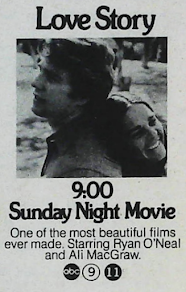 Sunday follows with the network television premiere of Love Story (9:00 p.m., ABC), the Erich Segal-penned smash hit from 1970, "that proved that schmaltz can be sold wholesale when properly packaged." Ryan O'Neal and Ali McGraw somehow copped Best Actor and Actress nominations, as did the picture (it lost to Patton, thankfully), which earns one of Crist's greatest reviews: Love Story "involved an inarticulate Harvard jock [O'Neal] and a doomed-to-die-of-an-unidentified disease Radcliffe Mozart maven [McGraw] whose articulation consisted primarily of four- and eight-letter obscenities. Since these are no-no words on television, we can anticipate a near-silent up-dated version of "Camille," with [McGraw and O'Neal] bleeping their way into the hearts of the Nation—with an unspoken 'Hello, sucker' for those who reach for the Kleenex instead of the Alka-Seltzer."
Sunday follows with the network television premiere of Love Story (9:00 p.m., ABC), the Erich Segal-penned smash hit from 1970, "that proved that schmaltz can be sold wholesale when properly packaged." Ryan O'Neal and Ali McGraw somehow copped Best Actor and Actress nominations, as did the picture (it lost to Patton, thankfully), which earns one of Crist's greatest reviews: Love Story "involved an inarticulate Harvard jock [O'Neal] and a doomed-to-die-of-an-unidentified disease Radcliffe Mozart maven [McGraw] whose articulation consisted primarily of four- and eight-letter obscenities. Since these are no-no words on television, we can anticipate a near-silent up-dated version of "Camille," with [McGraw and O'Neal] bleeping their way into the hearts of the Nation—with an unspoken 'Hello, sucker' for those who reach for the Kleenex instead of the Alka-Seltzer."Crist suggests the Alka-Seltzer should be kept for Monday's offering, The Beguiled (9:00 p.m., NBC), a Clint Eastwood vehicle that she calls "one of 1971's worst movies, obviously designed so that the family that likes to get sick together can do it at the movies—or while watching TV." I know this has become something of a cult favorite over the years, and it gets a favorable review from Quentin Tarantino, but as far as Crist is concerned, it's "a must for sadists and woman-haters." Oh well, she never did like Clint.
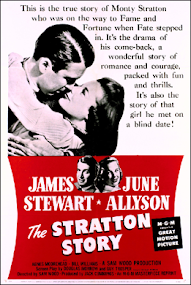 I've seen portions of The Beguiled, probably on one of its many showings on TBS (or was it TNT? I can never remember), but not enough to make a judgment. One movie I have seen, though, is 1949's The Stratton Story, the Tuesday night late movie (11:30 p.m., CBS), with Jimmy Stewart giving a moving performance as real-life Chicago White Sox pitcher Monty Stratton, who made a comeback after losing a leg in a hunting accident. It's one of those rare sports films that doesn't descend into schmaltz, probably because of Stewart and June Allyson, who plays his wife. Crist calls Stewart's performance "a personal triumph," and adds that "even non-ball-fans will thrill to ninth-inning excitement on the diamond and the heart and sentiment of the story."
I've seen portions of The Beguiled, probably on one of its many showings on TBS (or was it TNT? I can never remember), but not enough to make a judgment. One movie I have seen, though, is 1949's The Stratton Story, the Tuesday night late movie (11:30 p.m., CBS), with Jimmy Stewart giving a moving performance as real-life Chicago White Sox pitcher Monty Stratton, who made a comeback after losing a leg in a hunting accident. It's one of those rare sports films that doesn't descend into schmaltz, probably because of Stewart and June Allyson, who plays his wife. Crist calls Stewart's performance "a personal triumph," and adds that "even non-ball-fans will thrill to ninth-inning excitement on the diamond and the heart and sentiment of the story."Rolling Man, Wednesday's Movie of the Week on ABC (8:30 p.m.), stars Dennis Weaver as a man just out of prison, looking for revenge against "the man who wrecked his life," in what Crist sees as the "usual melodrama." And on Thursday, The Undefeated (9:00 p.m., CBS) offers John Wayne, Rock Hudson, and Rebel soldiers, Mexican bandits, Indians on the warpath, and Andrew V. McLaglen's "usual immortalize-the-worst-of-Western-cliches direction." Compared to Love Story and The Beguiled, though, it "almost seems bearable."
The week ends on a positive note, though, with Friday's rerun of 1967's To Sir, with Love (9:00 p.m., CBS), starring Sidney Poitier as a dedicated teacher trying to get through to students in the London slums. It's sentimental and cliche, of course, but Poitier is terrific, as is Judy Geeson; Crist says it has "a charm that I, for one, find irrestible." And, of course, there's Lulu's hit rendition of the theme, which should have, but wasn't, nominated for an Oscar. For trivia fans, the movie was written and directed by James Clavell, before he started writing mammothly successful novels about Japan.
l l l
But wait—there's more! Joan Crawford makes a rare television appearance Saturday on The Sixth Sense (10:00 p.m.), ABC's paranormal series starring Gary Collins as a parapsychology researcher. (You're perhaps more familiar with this series having seen chopped-up versions of it inserted into the syndicated release of Night Gallery.) Tonight, Crawford plays "the terrified victim of amateur psychics planning to prove heir powers by—quite literally—scaring her to death. It's directed by John Newland, best-known as the host of the classic One Step Beyond.
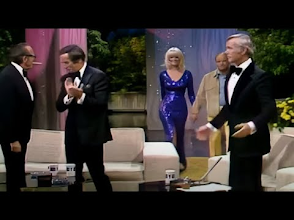 Johnny Carson's actually working on Monday, and for good reason: it's his 10th anniversary as host of The Tonight Show, and the stars are out to help him celebrate. (11:30 p.m., NBC; the prime-time celebrations haven't started yet) Among the luminaries: Jack Benny, Joey Bishop, George Burns, Sammy Davis Jr., NBC president Don Durgin, Jerry Lewis, Ronald Reagan, and Rowan and Martin. You can see the whole show
here
, and it's worth it; I remember staying up late to watch, even though I had to get up for school the next day. Boy, that kind of thing right there makes retirement worth it.
Johnny Carson's actually working on Monday, and for good reason: it's his 10th anniversary as host of The Tonight Show, and the stars are out to help him celebrate. (11:30 p.m., NBC; the prime-time celebrations haven't started yet) Among the luminaries: Jack Benny, Joey Bishop, George Burns, Sammy Davis Jr., NBC president Don Durgin, Jerry Lewis, Ronald Reagan, and Rowan and Martin. You can see the whole show
here
, and it's worth it; I remember staying up late to watch, even though I had to get up for school the next day. Boy, that kind of thing right there makes retirement worth it.Sticking with late-night, Dick Cavett has another of his single-guest shows, and tonight his only guest is Bob Hope. who can easily fill 90 minutes. (Wednesday, 11:30 p.m., ABC) Here it is , if you're looking for proof. And earlier that night on the same network, Robert Goulet is the only guest on an all-music episode of The Julie Andrews Hour (10:00 p.m.). The pair, performing together for the first time since their Broadway run in Camelot, do medleys from Broadway shows that were playing at the same time, as well as Gershwin's Porgy and Bess. You can see that on YouTube as well!
And there's one more show we ought to note: The Last of the Curlews (Wednesday, 4:30 p.m.) the debut episode of the ABC Afterschool Special (you can, of course, see it here ), which would be a mainstay of ABC's daytime schedule for 25 years, with 154 episodes from 1972 to 1997. During that run, the series won 51 Daytime Emmy Awards and four Peabody Awards.
l l l
Earlier, I made a snide comment about the FCC's Prime Time Access Ruling , for which I have absolutely no intention of apologizing. It was intended to provide greater community-oriented programming, but instead wound up giving us shows like Police Surgeon and endless strips of sitcom reruns. (There's also Jeopardy and Wheel of Fortune, which ironically had the reverse effect of making local schedules look even more homogeneous, rather than being tailored to the needs of individual markets.)
 But, as Daniel Yergin points out, there is one redeeming thing to have come out of this misguided order, and that's the appearance of Doctor in the House, an import from London Weekend Television (LWT) that's making a surprise breakthrough on American television. We've become accustomed to seeing British imports over here, especially on PBS, but that hasn't always been the case; While American shows have become increasingly prevalent across the ocean, Yergin notes that it's been mostly one-way traffic.* Richard Price, LWT's international sales agent, says that with the U.S. market comprising well over 50 percent of the entire world market, it's vital to make entry. Doctor in the House, however, was a tough sell.
But, as Daniel Yergin points out, there is one redeeming thing to have come out of this misguided order, and that's the appearance of Doctor in the House, an import from London Weekend Television (LWT) that's making a surprise breakthrough on American television. We've become accustomed to seeing British imports over here, especially on PBS, but that hasn't always been the case; While American shows have become increasingly prevalent across the ocean, Yergin notes that it's been mostly one-way traffic.* Richard Price, LWT's international sales agent, says that with the U.S. market comprising well over 50 percent of the entire world market, it's vital to make entry. Doctor in the House, however, was a tough sell. *I'm assuming that Yergin is discounting programs isuch as The Avengers, Danger Man, The Prisoner, and The Saint, which appeared on network television (rather than in syndication) and, in some cases, were joint productions with American networks.
"Programming people in the U.S. had traditionally been worried about the American backwoods," Price says, echoing the concerns we read earlier about the proposed Sherlock Holmes series. "We told them that with an ever-larger number of people moving across the Atlantic, breaking down barriers, there would be more acceptance of English attitudes and accents." Finally, he was able to convince some executives from Group W to watch an episode, and "they fell out of their chairs."
It seems surprising to hear all this provincial talk about British shows, given how prevalent Anglophiles are today, but it's true that PBS had a lot to do with the growth of British TV here—so much so, in fact, that early critics of PBS claimed the network's dependence on the BBC stunted the growth of programs made in America. That's a topic for another day (and, indeed, there's an article in this issue by Dr. John C. Schwarzwalder, a top executive at Minneapolis-St. Paul public-TV station KTCA and a longtime critic of the Corporation for Public Broadcasting, on how public television needs to be reformed), but for now we can see that the British invasion of American television is in full swing, and there hasn't been a letup yet.
l l l
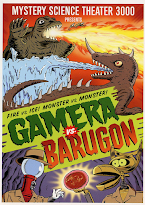 MST3K alert: War of the Monsters, aka Gamera vs. Barugon (Japanese; 1966) Tokyo ravaged by special-effect creations. Kojiro Jongo, Akira Natsuki, Kyoko Enami. (Saturday, midnight, WRCB in Chattanooga) The description really sells this movie short; it's the long-awaited sequel to 1965's Gamera, the Giant Monster, and the 13th movie in the epic saga of the flying, flame-spewing turtle who started out as a monster determined to wreak havoc on Tokyo but morphed into "a protector of humanity especially children, nature, and the Earth from extraterrestrial races and other giant monsters." The lesson, I suppose, is to be good to giant monsters, and they'll be good to you. TV
MST3K alert: War of the Monsters, aka Gamera vs. Barugon (Japanese; 1966) Tokyo ravaged by special-effect creations. Kojiro Jongo, Akira Natsuki, Kyoko Enami. (Saturday, midnight, WRCB in Chattanooga) The description really sells this movie short; it's the long-awaited sequel to 1965's Gamera, the Giant Monster, and the 13th movie in the epic saga of the flying, flame-spewing turtle who started out as a monster determined to wreak havoc on Tokyo but morphed into "a protector of humanity especially children, nature, and the Earth from extraterrestrial races and other giant monsters." The lesson, I suppose, is to be good to giant monsters, and they'll be good to you. TV
Published on September 30, 2023 05:00
September 29, 2023
Around the dial

 The great David McCallum died this week, aged 90. Although he had a long and successful run on the show NCIS, for many, he'll always be remembered as Illya Kuryakin on The Man From U.N.C.L.E., the man given the seemingly impossible task of humanizing Robert Vaughn—and succeeding. He was, indeed, "ultra-cool," as Terence says in this fond appreciation of his career at A Shroud of Thoughts.
The great David McCallum died this week, aged 90. Although he had a long and successful run on the show NCIS, for many, he'll always be remembered as Illya Kuryakin on The Man From U.N.C.L.E., the man given the seemingly impossible task of humanizing Robert Vaughn—and succeeding. He was, indeed, "ultra-cool," as Terence says in this fond appreciation of his career at A Shroud of Thoughts. In the "same church, different pew" category, we skip to Cult TV Lounge and the much-maligned The Girl From U.N.C.L.E. , starring Stefanie Powers and Noel Harrison. In truth, the series had enough highlights that it wasn't a total waste, but it unfortunately arrived on the scene when its partner series was at its nadir, and the franchise build experiment ended after one season.
From spies to cowboys—at Television's New Frontier: the 1960s, we arrive at Gunsmoke in 1962, a year which sees the Western continue to evolve in a one-hour format, adds Burt Reynolds to the cast, and introduces another character that wouldn't become a regular for another year: Festus Haggen, played by Ken Curtis.
From the definitive Western, we go to the definitive animated space opera, as Mike continues his look at the animated Star Trek with the episode " One of Our Planets is Missing " at The View from the Junkyard. I always did enjoy how it displays such continuity with the original series, and Mike rightly sees it as a continuation of TOS.
I write often about how prominent movies were during the fundamental days of classic television, and what would those days be without the science fiction and fantasy classics helmed by George Pal? Martin Grams reviews a new biography of Pal, George Pal: Man of Tomorrow , writen by Justin Humphreys; if you're a fan of his work, this book is for you.
At Drunk TV, Paul explores the third season of Dennis the Menace , which includes the sudden death of Joseph Kearns, the actor who played Mr. Wilson. What did it mean for the series to lose a character so important to the story? And how does Gale Gordon fare as Mr. Wilson's brother, in what looks to be a test for his future role as Lucille Ball's exasperated foil? Read all about it.
We've spent today mostly in the 1960s, so let's skip ahead a few years, as David continues his Comfort TV journey through 1970s TV with a stop at Saturday nights, 1972 . It wasn't always sports and reruns on Saturday, as we see from a list that includes classics such as All in the Family, Mary Tyler Moore, Bob Newhart, Mission: Impossible (all on CBS!), plus Emergency! and The Streets of San Francisco.
Cult TV Blog keeps us in the 1970s, as John kicks off his look at the decade with the corporate-intrigue drama The Organization , and while you probably haven't heard of it, it was winner of the Writers' Guild of Great Britain Award for Best Television Drama Series in 1973. And by the way, John has a new address for the blog; be sure to make a note of it.
Finally, an interesting piece at the religion site Aleteia on how G.K. Chesterton explains why "prestige television" is boring . Agree or disagree, there are some provocative points to consider here, and some that you've read in comments here in the past. We know that not all classic TV is classic, but today's writers could do a lot worse that to look to the past to see what works. TV
Published on September 29, 2023 05:00
September 27, 2023
Guest Essay: Growing up with KTVU
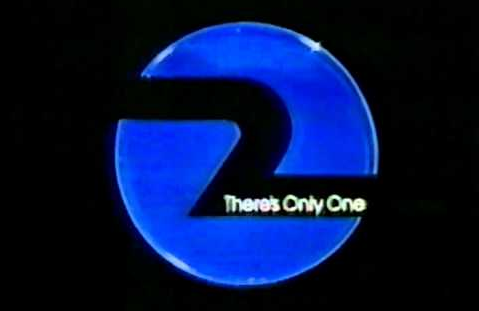
Today I'm pleased to present a guest column by Bill Griffiths, a loyal reader of It's About TV. Sparked by our recent Northern California TV Guides, Bill and I struck up an email conversation, and Bill offered to share his memories of television in Northern California, in particular the then-independent giant KTVU. Whether or not you're from the Bay Area, I think you'll enjoy his essay; I'll bet it brings back some fond memories for you as well!
by Bill Griffiths
 Some time ago I came across It’s About TV and started reading with great interest Mitchell’s entries about TV Guide. No matter what the year or the regional edition, I’ve encountered fascinating nuggets about television and media history. It is also a reminder about how great and influential a magazine TV Guide had once been. The name may still be around, but the product is indistinguishable from other entertainment publications. What has inspired me to contribute an article came about from the recent spotlight of Northern California TV Guides. I am a native of the San Francisco Bay Area, and while these late 1960’s issues predate me, I enjoy reading about the highlights and listings of these familiar channels—the ones I used to watch: KRON 4 (NBC), KPIX 5 (CBS), KGO 7 (ABC), KQED 9 (PBS). Unfortunately, we were not able to adequately view most of the UHF stations, although independent KFTY-TV 50 in Santa Rosa came in pretty good.
Some time ago I came across It’s About TV and started reading with great interest Mitchell’s entries about TV Guide. No matter what the year or the regional edition, I’ve encountered fascinating nuggets about television and media history. It is also a reminder about how great and influential a magazine TV Guide had once been. The name may still be around, but the product is indistinguishable from other entertainment publications. What has inspired me to contribute an article came about from the recent spotlight of Northern California TV Guides. I am a native of the San Francisco Bay Area, and while these late 1960’s issues predate me, I enjoy reading about the highlights and listings of these familiar channels—the ones I used to watch: KRON 4 (NBC), KPIX 5 (CBS), KGO 7 (ABC), KQED 9 (PBS). Unfortunately, we were not able to adequately view most of the UHF stations, although independent KFTY-TV 50 in Santa Rosa came in pretty good.  Of all these channels, there is one that stood out, and it was easy to see why it was one of the top-rated independent stations in the country: KTVU Channel 2. As a child, it was impossible to watch KTVU for too long without hearing its memorable slogan "There’s Only One Two" accompanied by its familiar logo, which was refereed by many as the Circle Laser 2. While KTVU has changed over the years, going from an independent channel to a charter affiliate of the Fox broadcast network to being owned by the Fox Television Stations Group, the classic "2" logo is still in use as it has been since 1975. Even you have never lived in the Bay Area, you may have heard of or even seen a little of KTVU. The alliance with Fox would bring the station some national recognition with several scenes in the 1993 Robin Williams comedy hit Mrs. Doubtfire utilizing the Channel 2 studios at Jack London Square in Oakland. I remember watching the movie upon its release and when an establishing shot of the building signage came on the screen, there was an audible reaction by most people in the theater!
Of all these channels, there is one that stood out, and it was easy to see why it was one of the top-rated independent stations in the country: KTVU Channel 2. As a child, it was impossible to watch KTVU for too long without hearing its memorable slogan "There’s Only One Two" accompanied by its familiar logo, which was refereed by many as the Circle Laser 2. While KTVU has changed over the years, going from an independent channel to a charter affiliate of the Fox broadcast network to being owned by the Fox Television Stations Group, the classic "2" logo is still in use as it has been since 1975. Even you have never lived in the Bay Area, you may have heard of or even seen a little of KTVU. The alliance with Fox would bring the station some national recognition with several scenes in the 1993 Robin Williams comedy hit Mrs. Doubtfire utilizing the Channel 2 studios at Jack London Square in Oakland. I remember watching the movie upon its release and when an establishing shot of the building signage came on the screen, there was an audible reaction by most people in the theater! Growing up in the 1970’s and 1980’s, those years viewing KTVU were a golden time. For starters, they seemed to have the best selection of cartoons such as the pre-1948 color Merrie Melodies/Looney Tunes, Tom & Jerry and Droopy, Woody Woodpecker, Popeye, Mighty Mouse, Heckle and Jeckle, Bullwinkle and Rocky, Spider-Man, and Scooby-Doo. Coming home from school, afternoons didn’t’ seem complete without some animated entertainment which generally was followed around 4:30 by that great live-action cartoon series Gilligan’s Island. Occasionally Gilligan and the crew would take a rest and another kid-friendly sitcom would turn up for a while such as the color episodes of My Three Sons and even the Barney Miller spin-off Fish.
Even with these re-airings of repeats, KTVU was willing to try something different in the late afternoon hours. In the 1960s there was Captain Satellite (Bob March). Almost a decade after its finale, came Captain Cosmic (with his wonder robot 2T2!) which was primarily formatted around dubbed versions of Japanese superhero shows. Capitalizing on the popularity of Star Wars and Star Trek (which enjoyed a long run in the early evenings on KTVU starting in 1969) the show was a hit for a time. The cosmic captain was played by Bob Wilkins, who also hosted the phenomenally popular late Saturday night Creature Features. I only have vague memories of Captain Cosmic, but vividly recall one of the featured programs "Ultraman". Then again, I was never much into science fiction and thus did not see too many Star Trek episodes.
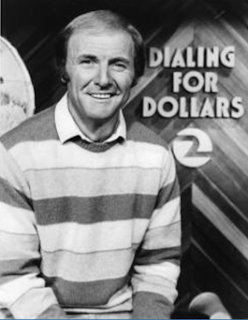 Pat McCormickIn between all this entertainment, KTVU made sure to throw in a little education during the commercial breaks. These gentle life lessons were called "Bits & Pieces" and generally ran about one minute each. The PSA’s ranged from promoting good manners and kindness to acknowledging people’s diverse backgrounds and heritage without being heavy-handed or divisive. The most entertaining featured the puppets Charley and Humphrey who were created, performed and voiced by the legendary KTVU personality Pat McCormick. Not until later did I discover that Charley (a horse) and Humphrey (a bulldog) once hosted their own popular afternoon show featuring many of those classic cartoon shorts I would ultimately enjoy. "Bits & Pieces" would rerun consistently into the early 90’s. McCormick was quite a presence on KTVU, hosting the live Dialing for Dollars movie series middays, being the MC of a short-lived interactive kids game called TV Powww, co-hosting the local portions of the annual Jerry Lewis Labor Day Telethon and serving as weatherman on The 10 O’Clock News until his retirement in 1995.
Pat McCormickIn between all this entertainment, KTVU made sure to throw in a little education during the commercial breaks. These gentle life lessons were called "Bits & Pieces" and generally ran about one minute each. The PSA’s ranged from promoting good manners and kindness to acknowledging people’s diverse backgrounds and heritage without being heavy-handed or divisive. The most entertaining featured the puppets Charley and Humphrey who were created, performed and voiced by the legendary KTVU personality Pat McCormick. Not until later did I discover that Charley (a horse) and Humphrey (a bulldog) once hosted their own popular afternoon show featuring many of those classic cartoon shorts I would ultimately enjoy. "Bits & Pieces" would rerun consistently into the early 90’s. McCormick was quite a presence on KTVU, hosting the live Dialing for Dollars movie series middays, being the MC of a short-lived interactive kids game called TV Powww, co-hosting the local portions of the annual Jerry Lewis Labor Day Telethon and serving as weatherman on The 10 O’Clock News until his retirement in 1995. I would move on from the classic cartoons, but would eventually revisit them and develop a deeper appreciation for their humor which was more mature than my boy brain could ever realize. From cartoons, my viewings of choice on Channel 2 shifted to comedies. Besides Gilligan, I laughed at the antics of I Love Lucy, The Lucy Show, Bewitched, The Odd Couple and other classics. In the 1980’s I often would watch M*A*S*H reruns, and that series proved very important to KTVU. Soon after the beginning of off-network repeats in 1979 the show became one of the biggest hits in the station’s history, so much so that it was being aired twice each evening. Significantly, the costs of each episode were made back in the commercial immediately following the opening credits. After that it was pure profit. That money went towards construction of a new state-of-the-art studio nearby from the old facilities. The building became known to staffers as "the house that M*A*S*H built". Equally enjoyable for me laugh-wise were other grown-up sitcoms such as Three’s Company, WKRP in Cincinnati, and two programs I first saw on KTVU before regularly watching them in first-run: Cheers and Newhart. Cheers followed a similar trajectory as M*A*S*H in that soon after its addition to the schedule it was being seen twice a night.
Popular rerun shows had always been the foundation of KTVU’s success in spite of the fact that the idea behind "There’s Only One Two" was to emphasize their strong position of independence. When looking at those 1960’s TV Guide listings, it surprised me that Channel 2 picked up some of CBS’s daytime schedule that was not cleared by KPIX. Thus, future classics such as The Jack Benny Program, The Andy Griffith Show and The Beverly Hillbillies had a weekday presence on Channel 2 while they were still producing new episodes. This even extended to game shows such as The [New] Price is Right when it premiered in 1972. Management must have decided that despite the prestige of network programming, by 1975 no CBS daytime shows were being seen on KTVU. If it wasn’t cleared by KPIX, one would have to look for them on either Channels 20 or 44, if they were picked up at all. Channel 20 (as KTZO and later KOFY) would take some CBS and NBC shows in the 1980’s (including daytime Price is Right) but that’s another story.
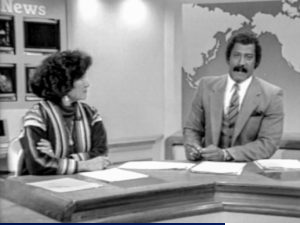 Betty Ann Bruno and Dennis Richmond, 1980sKTVU would proudly assert its status as a popular independent station through first-run syndicated programs, movie series (The 8 O’Clock Movie, Weekend Premiere, Sunday Super Cinema, KTVU Presents, Dialing for Dollars, The Movie of the Week, Chiller Diller and Creature Features), acquired documentaries, talk shows, British imports (Benny Hill was a long time late night staple), the aforementioned off-network reruns, and a nightly 10 p.m. news program. The 10 O’Clock News was the quintessential example of an honest straight-forward award-winning newscast with anchors and reporters staying on for years and even decades-long tenures. To name more than a few: Dennis Richmond, Elaine Corral, Barbara Simpson, Vern Hawkins, John Fowler, Rob Roth, Betty Ann Bruno, Faith Fancher, Rita Williams, Lloyd LaCuesta, George Watson, Leslie Griffith, Bob Shaw, Tom Vacar, Brian Banmiller on business, sports with Gary Park, Mark Ibanez and Joe Fonzi, weather with Pat McCormick and Bill Martin, and feature reporter Bob MacKenzie who also reviewed shows for TV Guide. Some of his reviews you may have seen on this blog.
Betty Ann Bruno and Dennis Richmond, 1980sKTVU would proudly assert its status as a popular independent station through first-run syndicated programs, movie series (The 8 O’Clock Movie, Weekend Premiere, Sunday Super Cinema, KTVU Presents, Dialing for Dollars, The Movie of the Week, Chiller Diller and Creature Features), acquired documentaries, talk shows, British imports (Benny Hill was a long time late night staple), the aforementioned off-network reruns, and a nightly 10 p.m. news program. The 10 O’Clock News was the quintessential example of an honest straight-forward award-winning newscast with anchors and reporters staying on for years and even decades-long tenures. To name more than a few: Dennis Richmond, Elaine Corral, Barbara Simpson, Vern Hawkins, John Fowler, Rob Roth, Betty Ann Bruno, Faith Fancher, Rita Williams, Lloyd LaCuesta, George Watson, Leslie Griffith, Bob Shaw, Tom Vacar, Brian Banmiller on business, sports with Gary Park, Mark Ibanez and Joe Fonzi, weather with Pat McCormick and Bill Martin, and feature reporter Bob MacKenzie who also reviewed shows for TV Guide. Some of his reviews you may have seen on this blog. It was a surprise when KTVU became a charter affiliate of the Fox Network in 1986. While Channel 2 could have stayed independent, research and ratings were showing the growing influence of cable/satellite which would ultimately make it more challenging to acquire first-rate movies and series-- thus the decision to join with an upstart network. Because Fox began with a limited schedule, KTVU would continue to look much like an independent station into the early 1990’s. Gradually during the decade Channel 2 would increasingly identify on-air as "Fox 2", which It does to this day.
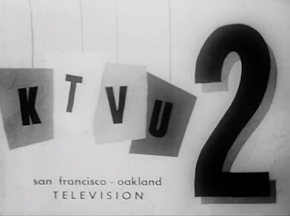 I do miss those simpler times coming home from school and turning the set onto Channel 2 to be entertained for a while. Thanks to YouTube, I can experience some of those bits and pieces of KTVU video memories. For example, I recently discovered a half-hour
50th anniversary special
from 2008 comprised of various clips and interviews covering the station’s history and legacy. Going further back is an almost complete
1968 episode of Captain Satellite
with promos for upcoming telecasts of roller derby, Giants vs. Dodgers baseball and Romper Room. Others have posted shorter moments such as promos, station ID’s,
Charley and Humphrey's PSA's
, Bob Wilkins’ sardonic host segments, and the introductions to movie broadcasts with graphics and music that could rival those of the networks. They’re worth checking out. Perhaps they may lead you to look for local television clips from where you grew up. For me, seeing those KTVU Channel 2 images come alive once more takes me back to a time of the not-too-distant past where "There’s Only One Two".
I do miss those simpler times coming home from school and turning the set onto Channel 2 to be entertained for a while. Thanks to YouTube, I can experience some of those bits and pieces of KTVU video memories. For example, I recently discovered a half-hour
50th anniversary special
from 2008 comprised of various clips and interviews covering the station’s history and legacy. Going further back is an almost complete
1968 episode of Captain Satellite
with promos for upcoming telecasts of roller derby, Giants vs. Dodgers baseball and Romper Room. Others have posted shorter moments such as promos, station ID’s,
Charley and Humphrey's PSA's
, Bob Wilkins’ sardonic host segments, and the introductions to movie broadcasts with graphics and music that could rival those of the networks. They’re worth checking out. Perhaps they may lead you to look for local television clips from where you grew up. For me, seeing those KTVU Channel 2 images come alive once more takes me back to a time of the not-too-distant past where "There’s Only One Two". l l l
Many thanks, Bill! I'm grateful for you taking the time to share your thoughtful essay. The warmth of those memories shows through in what you've written, and I think that's precisely what so many people feel about television of the past, and what we risk losing in these homogenized times when the local imprint of television seems to be getting smaller and smaller. This will certainly enhance the experience for me whenever I write about a TV Guide from the Bay Area!
If you'd like to share your memories of growing up with television, or if you have a TV Guide you'd like to relive, I'd be only too happy to share them with everyone else. You know how to reach me! TV
Published on September 27, 2023 05:00
It's About TV!
Insightful commentary on how classic TV shows mirrored and influenced American society, tracing the impact of iconic series on national identity, cultural change, and the challenges we face today.
- Mitchell Hadley's profile
- 5 followers



